|
9/24/2023 0 Comments September 25, 2023Teaching | Mission Update & Prayers
watch above/read below
This Week's Teaching: "The Forgiving & Punishing God"
When God described himself to Moses in Exodus 34, he said that he forgives wickedness, rebellion and sin. But THEN he said that he doesn't leave the guilty unpunished. How do we make sense of that? I think there are two ways to understand this, but they're not either/or, they're both/and. Let's get to know the forgiving and punishing God.
TRANSCRIPT
So, imagine God comes to you and he takes your face in his hands and he says, listen to me. I am the Lord. I'm the Lord. That's my name. Yahweh, Yahweh. I'm not some impersonal force. I am the personal God. I am Yahweh. I am the Lord, the Lord. You can know me. And then he says, let me tell you about myself. I am the compassionate and gracious God. I am kind. You can trust me. And he says, I am slow to anger. I am patient. I don't want anyone to perish. I am patient so that everyone has opportunity to turn their lives around and get right. I am kind. I am patient. I'm slow to anger. And I am abounding in love and faithfulness. I love you so much. I love you so much. I am the loving and faithful God. I maintain love to thousands and I maintain love to you. I am good toward you. I am inclined toward your good. I am full of love and faithfulness. You can love me. You can count on me. And then he says, And I am the forgiving God. I forgive wickedness, rebellion and sin. Anytime that you have chosen to do what is wicked -- something that's not good, that's evil -- chosen wickedness, I'm inclined to forgive you. And anytime you have rebelled against me, knowing that I said one thing and you've done another thing, I am inclined to forgive you. And any time you have erred, any time you have sinned, any time you decided you weren't going to do something and you did it anyway, or any time you decided that you were going to do something and you failed to do it, I forgive sin. I am inclined to forgive you. I am inclined to forgive wickedness and rebellion and sin. That is my nature. What if God came to you and said that? What if God came to you and described himself to you that way? You would be enthralled. You would be filled with joy. You would be ready to turn toward him with anything that has been turned away from him. This is God. Yahweh, Yahweh, the Lord, Lord, he's kind, he's patient, he's good, and he's forgiving. He's forgiving. But then what if he said, Oh, I also punished the guilty. I will not leave the guilty unpunished. In fact, I punish the children and their children for the sins of the parents to the third and fourth generation. I'm a forgiving God, but I'm a punishing God. I will not leave the guilty unpunished. What would you do with that? There's two ways we can hear it. If he's saying that I forgive wickedness, rebellion and sin, but I will not leave the guilty unpunished, we could say the difference is people who ask for forgiveness or people who persist in guilt. We could say that, that forgiveness absolves the guilt. We could say that and that would be true. One John one says, "If we confess our sins, he is faithful and just and will forgive us our sins and purify us from all unrighteousness." This is our God that is not punishing the guilty for their sins. It's forgiving and purifying them from their sins. And this is a clear, true way to read it. But even with that, if there is forgiveness through repentance, and yet God punishes the children and their children for the sins of the parents to the third and fourth generation, does that mean that if my grandparents failed to ask forgiveness that God is going to punish me? What's with that? Or if I ask forgiveness, then somehow my kids don't have to pay for it. I think the second way we can hear this -- like, not to take at all away from the fact that there is forgiveness and that those who seek God's forgiveness are not punished as guilty. They will inherit eternal life. They are freed from the penalty of death. All that. That is slam dunk, done, deal. But, there's another way to read this, an additional way to read this, that God has woven wisdom into the fabric of creation. And part of that wisdom is that we reap what we sow. And so if someone commits an act of wickedness, they will experience things they're not supposed to experience and they will live with the consequences of that for the rest of their life. Now they may seek forgiveness. You may seek forgiveness and be granted forgiveness. You won't die in your sin, but you will live out the consequences of that choice. Someone who persists in wickedness will live with multiplied consequences of those choices. And they may, on their deathbed, or they may, at age 30, ask God to forgive them for all the wickedness they've done. And He will forgive them, and yet they will live out the consequences for as long as they're here. They will live out the consequences of that wickedness and their children and their children will live out the consequences for the choices to persist in wickedness. Or rebellion. If you walk down the rebellious path, you will end up in places that God said, don't go, and you will experience the consequences of that. The guilt of that action will bear punishment for you because God has sown wisdom into the very fabric of creation, and we reap what we sow. And so if you walk down the path of rebellion, not only will you suffer the consequences of that, but your children and their children will, because we wear out paths in rebellion and it's hard to get back out. Now you can ask God to forgive you and he does. He will free you from the penalty of eternal death. He will give you eternal life. He will even relate to you as if you are pure with him. He will forgive you. He will reconcile himself to you and he will reconcile you to himself. He will redeem you. All that. And yet you will likely need to live out the punishment of that guilt. And if you sin, if you decide to do something and don't do it, or if you decide not to do something and you do it anyway, and you err and you sin, you can call out to God and he'll forgive you for it. But the actions bear consequences. You reap what you sow. And so we can read this, that God allows our decisions to bear the consequences that they bear. We reap what we sow. And this is true. Is it unfair of God to let that happen? No, the opposite would be that anyone can do the worst things imaginable and they simply say a prayer and suddenly it undoes everything. And that would be to take away our free will. And God has -- whether you like it or not -- God has chosen to not take away your free will. And because of that free will, you get to sow good or bad. And because of that, you get to reap good or bad. You reap as you've sown. And so God, he comes to you, he takes your face in his hands and he says, I'm the Lord, I'm the Lord, you can know me. I'm kind. I am the compassionate and gracious God. This is my nature. And I'm slow to anger. You experience my patience that I haven't wiped you off the face of the earth. You experience my patience every day. That is so that you can be right with me. That you can turn from your sin, because I don't want anyone to perish. I am God. I am kind. I am patient. And I'm good. I am abounding in love for you. And I am faithful to the nth degree. And I am inclined to forgive you. I'm inclined to forgive you. Even if you may need to live out the consequences on this earth of the decisions you've made, I forgive you. I forgive you. And I will give grace to you to make amends. I will give grace and wisdom to your children to make right what you made wrong. And I will give grace and wisdom to their children to continue the process as you and your family "choose this day whom you will serve: we will serve the Lord." And if you find yourself paying for the consequences of your parents or their parents, God gives you grace and wisdom because he is God. He is kind. He is patient. He is good. And he forgives. And so now as you have time, turn to him, turn to him. And be forgiven and be reconciled. This is our God. And this completes Exodus 34, where God spoke to Moses and revealed himself. This is the God that we serve and that we have always served. This is "the LORD, the LORD." And Jesus is the exact representation of his being. Colossians 1. "God was pleased to have all his fullness dwell in Jesus and through him to reconcile to himself all things, whether things on earth or things in heaven, by making peace through his blood shed on the cross. Once you were alienated from God and you were enemies in your minds because of your evil behavior. But now, God has reconciled you by Christ's physical body through death to present you holy, in His sight, without blemish, and free from accusation, if you continue in your faith, established and true, and do not move from the hope held out in the Gospel. This is the Gospel..." The LORD, the LORD. He can be known. He is kind. He is patient. He is good. He loves you with all that he is. And he is inclined to forgive you. Turn from sin. Turn to him. And he will make you holy and pure and blameless and free from accusation. This is our gospel. This is our gospel. Turn to the Lord through faith in Christ. Amen. Mission Update: Portland, Oregon
0 Comments
9/18/2023 0 Comments September 18, 2023Teaching | Mission Update & Prayers
watch above/read below
This Week's Teaching: "God is Good!"
So this is week four, looking at how God describes himself.
We've been looking at Exodus 34:5-8, where God comes to Moses and he says of himself, "the LORD, the LORD (Yahweh, Yahweh), the compassionate and gracious God, slow to anger, abounding in love and faithfulness." We've already looked at how when he said, "Yahweh, Yahweh," he said, "I am your God. I'm who I am. And you can know me." And then he said, "I am kind." Then he said what we saw last week, "I am patient." And this week we'll see how he describes himself as good. Now in the passage that I just read, the translation I just read, He describes himself as "abounding in love and faithfulness." Now, I could say that God describes himself as loving and I could say that he describes himself as faithful. But the way we relate to loving has mixed meanings for us. And the way we relate to faithful has some mixed meanings, and so I'm saying God is good. And that'll make sense as I explain. Now, if I told you God loves you, that's a welcomed thing. If someone tells me "God loves you," oh, that's such good news. But what if he's bad? What if he's bad and he loves me? That's not so good news. Like, what if he's malevolent? What if he's not good natured and he loves me? That becomes actually bad news. That becomes something I need to be afraid of. So God loves you, but what if he's bad? What if he's malevolent? Or what if he is benevolent? What if he is goodwilled, but he's just bad at loving? What if he's not good at it? What if he means well, but is unreliable in his love? Again, that's bad news. That's not good news. And so if I tell you, God loves you... What is he like? I'm saying he is good. If God is not trustworthy, He is not loving. And if God is not loving, He is not trustworthy. But if God is not good, He is neither loving or trustworthy. And so I'm saying God is good. Let's lean into this. Let's pick apart the loving and the faithful and you'll see why it means good. Now, when God describes Himself as abounding in love, the abounding is plenteous. It's abundant. It's enough. It's more than you could ever need. He has that much love for you. But what is love? In some of the translations, it would be described as good. Some would describe it as loving-kindness. This is love. We might relate to love as affection, because that's how we relate to others; "I have such affection for you." And I would say it's true that God has affection for you. But when he describes himself as abounding in love, it's not abounding in affection. That can come and go. If you become less than lovable, affection can come and go. But when he says, I am abounding in love, he says, I have more love for you than you could ever need. And that kind of love can be described as not just enjoyment of us, but goodness and kindness for us or toward us. He is abounding in love. He has more love for you than you would ever need. He redeems us from our enemies. He redeems us from our troubles. He redeems us from sin. He keeps his covenant with us. He is merciful toward us. He has good deeds toward us. And some of this overlaps with what we looked at in the second week on this. In 1 John, we read about God's love when we read, "God is love." This is 1 John 4. Read this and just, wherever there's "love," put a heart around it or something like that, and you'll just see how often John talks about love in this. And he says, verse seven, "Dear friends, let us love one another for love comes from God. Everyone who loves has been born of God and knows God. Whoever does not love does not know God because God is love. This is how God showed his love among us. He sent his one and only Son into the world that we might live through him. This is love, not that we loved God, but that he loved us and sent his Son as an atoning sacrifice for our sins. Dear friends, since God so loved us, we also ought to love one another." Verse 16, "God is love." That's the second time John says it: "God is love." We could read on and on and on. God is love. He is abounding in love for you. And this is how he showed his love for us. He gave his Son as an atoning sacrifice for your sin... He, being very God became flesh and lived for awhile among us so that he could die our death, and defeat death, and be raised to life to give life to whoever would choose it. He loves us that much that he paid our penalty. He wouldn't have had to. He did it by his choice. He is abounding in love for you. But not just abounding in love. He is abounding in faithfulness. When we think about faithfulness, let's not think so much about how we might use it in our relationships. When you think of this kind of faithfulness of God, don't think so much of fidelity, as we might in a marriage -- faithful in marriage, fidelity in marriage. If I describe myself as faithful to my wife, people would understand that means fidelity to her. Or if I might describe myself as faithful to a certain group of people, I am loyal to that group of people. We recognize it as that. But when God says he's abounding in faithfulness, let's not hear it quite so much as fidelity and loyalty, although it has elements of that, but let's hear it more as trustworthy and true. Trustworthy; he can be relied upon. And true to himself; true to truth. He is true. He's not wavering. He represents stability, continuance, truthfulness, rightness. In a word, he is trustworthy. He's faithful. He is abounding in faithfulness. He is trustworthy. In 2 Timothy, Paul describes God and says, "Here is a trustworthy saying, If we died with him, we will also live with him. If we endure, we will also reign with him. If we disown him, he will also disown us. If we are faithless, he remains faithful for he cannot disown himself." He is faithfully who he is. He's abounding in love and faithfulness. He is trustworthy. He is good. Like I say, if he's not trustworthy, he's not loving. And if he's not loving, he's not trustworthy. But if he's not good, he's neither loving or trustworthy. He is good, because he's abounding in love and faithfulness. In Psalm 145, this Psalm of David, he mentions the same phrase of Exodus 34 and other places where God describes himself. And this is verse 8. "The Lord is gracious and compassionate, slow to anger and rich in love..." And so this is that same concept. It says, "The Lord is good to all. He has compassion on all he has made." And David says, "All your works praise you, Lord. Your faithful people extol you. They tell of the glory of your kingdom, and they speak of your might, so that all people may know of your mighty acts and the glorious splendor of your kingdom." He says, "Your kingdom is an everlasting kingdom. And your dominion endures through all generations." And then he writes this: "The Lord is trustworthy." "The Lord is trustworthy in all the promises, and faithful in all he does. The Lord upholds all who fall and lifts up all who are bowed down." He says, "The eyes of all look to you and you give them their food at the proper time. You open your hand and you satisfy the..." -- listen to how good God is -- "you open your hand and satisfy the desires of every living thing. The Lord is righteous in all his ways and faithful in all he does. The Lord is near to all who call on him, to all who call on him in truth. He fulfills the desires of those who fear him. He hears their cry and saves them. The Lord watches over all who love him, but all the wicked he will destroy." Now we'll get to that in a week or two. The punishing God. That's a part of this. But listen: "The Lord watches over all who love him... He hears their cry... He saves them... He fulfills the desires of all who fear him..." Then David says, "My mouth will speak in praise of the Lord. Let every creature praise his holy name forever and ever." Do you believe God loves you? Do you believe he is trustworthy? And probably, the people I'm talking to would say yes, he loves me, he is trustworthy. But let me ask you this: Do you believe he's good? Do you believe he is good? That when he loves you, he's not bad, and he's not bad at it; he is good. And when he is faithful, when he is trustworthy, he is good. Do you believe, not just that he loves you and is trustworthy, do you believe that God is good? To his core, good? This is God's self revelation: I am God, you can know me. I am kind, you can trust me. I am patient, repent while there's time. And I am good, so you can love me. If you've ever loved someone who was bad, who was malevolent, who was not "worthy" of love, you know how painful that is. But God is good, and so you can love him. Apply yourself to loving God this week. It's the essence of worship. Make sure that you know God. Amen. Mission Update & Prayer
9/10/2023 0 Comments September 11, 2023Teaching | Mission Update & Prayers
watch above/read below
This Week's Teaching: "God is Slow to Anger , but for How Much Longer?"
If you say to someone, "Don't be angry with me," you can say it either as, "Don't you be angry with me," or you can say it as, "Please don't be angry with me."
The first one, "Don't you be angry with me," is this insinuation that you have no right to be angry with me either because I did nothing wrong or, looking at you, you know, you're no better than I am. " Don't you be angry with me." On the other hand, if it's, "Please don't be angry with me," it's this admission of guilt and that, "Yes, you have every right to be angry with me, but please have mercy. Please be patient with me." When God revealed himself to Moses, he said -- we've been looking at this the last few weeks -- he said in Exodus 34, " I am who I am. I am God. And so you can know me." And then he said, "I'm full of mercy and compassion." And I said last week, that's like saying, "I'm kind." So "I am God; you can know me." And "I'm kind; you can trust me." And then he said, "I am slow to anger." Slow to anger. And the word I'm giving that is: Patient. God says, "I am God, I am kind, I am patient." Question: Is patience strong or weak? Like, how do you normally think about it? Is patience strong or weak? Like I've had people say, "Well, you're way more patient than I would be." And it's almost like this insinuation that, "You're way weaker than I would be. I would never let someone get by with that. You are way weaker than I would be." Is patience weak? Or I've had people say, " Wow, I don't know how you can stay so patient." And it's sort of like this sense of, "You are strong enough to be patient." Like, how do you relate to it? Is patience strong or weak? As I've thought about it, it depends on the context, whether I think of it as patient or weak. If it's being patient with a child while they learn to walk, that's strong. Or even being patient with a child while they learn obedience to a parent. In that context, patience is strong. And even where it's with peers, if it's patience with a spouse, as they learn to live respectfully in close quarters with another, that's strong. Like, please be patient with me. I'm trying. That is strong. Patience is strong. But if it's patience with an abuser while they try to abuse you, or if it's patience with a thief while they try to steal from you, I don't think patience is strong. I relate to that as weak. It's being reluctant to take action where action should be taken. Patience is sometimes strong and sometimes weak. I mean, it depends on the context. And it also depends on who is the one being patient. If we talk about a two year old throwing a temper tantrum with their mom, we get that. That's one kind of impatience. But if we talk about a judge patiently listening while you make a thorough defense before they pass judgment, well, that's a strong patience. And so it depends on the context of what we mean. Like, is patience weak or strong? It depends on the context and it depends on who the person is being patient. God says, "I am slow to anger. I am patient." We read it in Exodus 34. "The LORD, the LORD (Yahweh, Yahweh), the compassionate and gracious God, slow to anger." He's slow to anger. Now it's tempting to say, Oh, he doesn't get angry with us. God, he knows what we're like. He just kind of gives us a buy. He's like, "Nah, you and me, we're good. I get you. We're fine." Like that kind of a God never gets angry at anything. But, if we talk about a God who is slow to anger, we're talking about a God who does get angry. We're talking about a God who does get angry. In fact, slow to anger only means something if God does get angry. And it's only meaningful if slow to anger is not about temper tantrums, but it's actually about judgment. God describes himself as slow to anger. Romans 2. In Romans 2, Paul says, "Do you think you will escape God's judgment? Or do you show contempt for the riches of his kindness, forbearance and patience, not realizing that God's kindness is intended to lead you to repentance?" He says, "But because of your stubbornness and your unrepentant heart, you are storing up wrath against yourself for the day of God's wrath when his righteous judgment will be revealed." Then he says this Romans 2:6. Know this verse; this is true. "God will repay each person according to what they have done." He will repay each person according to what they have done. "To those who by persistence in doing good seek glory, honor, and immortality, he will give eternal life. But for those who are self seeking, and who reject the truth and follow evil, there will be wrath and anger. There will be trouble and distress for every human being who does evil, but glory, honor, and peace for everyone who does good. For God does not show favoritism." God will repay. So he is slow to anger, but he will get angry. In fact, as we keep on working through Exodus 34, we'll get to that part where he says he is a punishing God. We'll get to that in more depth. But for today, he's slow to anger, which means he will get angry. It doesn't mean he won't be angry. It says that he is slow to anger. He's not quick-tempered. He's not quick-tempered. In Proverbs we are challenged to not be quick-tempered. This is the wisdom of God and we learn it from God. In Proverbs 14:17, "a quick tempered person does foolish things. And the one who devises evil schemes is hated." And verse 29. " Whoever is patient has great understanding, but one who is quick-tempered displays folly." We learn this from God. We are not to be quick-tempered, and He is a God who is slow to anger. He is not quick-tempered. He is patient. He's patient, but He will get angry. Wrath is coming for all who choose evil. He will repay everyone according to what they have done. In 2nd Peter there's so much that we could read about this. Spend time in 2nd Peter. I mean, 2nd Peter is beautiful. It starts off by saying, "His divine power has given us everything we need for living a godly life." That we can actually "participate [with him] in the divine nature." And it says, because of these things, "make every effort to add to your faith, goodness," and all those things. Read that. That's first chapter. But there's also this warning in 2nd Peter two and three, which I'm just going to read parts through it, just skipping down through. I would suggest that you spend time dwelling on it more than I want to in this format. But just reading through here: " For if God did not spare angels when they sinned, but sent them to hell, putting them in chains of darkness to be held for judgment; if he did not spare the ancient world when he brought the flood on its ungodly people, but protected Noah, a preacher of righteousness and seven others; if he condemned the cities of Sodom and Gomorrah by burning them to ashes and made them an example of what is going to happen to the ungodly; and if he rescued Lot, a righteous man who was distressed by the depraved conduct of the lawless.... If this is so, then the Lord knows how to rescue the godly from trials and to hold the unrighteous for punishment on the day of judgment. This is especially true of those who follow the corrupt desire of the flesh and despise authority." He says, "They will be paid back harm for the harm they have done..." He says, "Blackest darkness is reserved for them..." They're "slaves of depravity." He says, "Dear friends, I've written these things as reminders to stimulate you to wholesome thinking." And then he says this: "You must understand that in the last days, scoffers will come scoffing and following their own evil desires. They will say, 'Where's this coming he promised? Ever since our ancestors died, everything goes on as it has since the beginning of creation!'" And Peter says, "But they deliberately forget that long ago by God's word, the heavens came into being and the earth was formed out of water and by water. By these waters also the world of that time was deluged and destroyed. By the same word, the present heavens and earth are reserved for fire, being kept for the day of judgment and destruction of the ungodly." Then he says, "But do not forget this one thing, dear friends." He says, "with the Lord, a day is like a thousand years and a thousand years are like a day. The Lord is not slow in keeping his promise as some understand slowness. Instead, he is patient with you." Like he said in Exodus 34, "I am slow to anger." Peter says, " He is patient with you, not wanting anyone to perish, but everyone to come to repentance." He's slow to anger, not because he won't bring judgment, but because he wants everyone to have opportunity to repent. And Peter says, "The day of the Lord will come like a thief." When it comes, there will be no warning, it'll surprise us, it'll overtake us, and everyone who's not ready will be shocked and awed by it. And those who are ready will say, my reward is here. "The day of the Lord will come like a thief. The heavens will disappear with a roar." You know, everyone is talking about this these days. Is the Lord's return imminent? Yes. Do we know when he's coming? No. Should we be ready right now? Yes. Yes. I think I'll talk another time about signs and wonders and the possibility of deception in that, but right now, listen. This will happen. This is how it will be. The Lord is slow to get angry, but one day -- just like a thief breaks in at a time you're not expecting him -- the day of the Lord will come like a thief, the heavens will disappear with a roar, the elements will be destroyed by fire, and the earth and everything done in it will be laid bare." It'll be over. It'll be done. If we're still walking this earth, we will suddenly be done and we will suddenly face God. He's slow to anger, he's patient, but one day he will bring judgment. And it will be sudden and it will be with finality. Once the elements are destroyed, there's no going back. Once the earth is laid bare, once the heavens disappear with a roar, there's no going back. He's slow to anger, but he's not slow in keeping his promise. And one day he will come and he will rescue all of us who've put our faith in him. And he'll bring judgment on all who rejected him. That's how it is. And Peter says, "Since everything will be destroyed in this way what kind of people ought you to be? You ought to live holy and godly lives as you look forward to the day of God and speed it's coming." I was reading this and reflecting on it: "live holy and godly lives as you look forward to the day of God." Now we live in this world where we are all lamenting the passing away of things, whether it's climate change, whether it's the earthquakes, whether it's the fires, whether it's the hurricanes... whatever it is, we all have this sense that the earth is groaning and it's getting ready to give up. And we lament it, we mourn it. And we should take care of creation, absolutely, this isn't about that. But Peter says, "You ought to live holy (devoted to God, sacred, set apart, holy) lives, and godly lives, like he says in chapter one, "You may participate in the divine nature, having escaped the corruption in the world caused by evil desires." Where he says, "make every effort to add to your faith, goodness, and to goodness, knowledge, and to knowledge, self control, to self control, perseverance, and to perseverance, godliness, and to godliness, mutual affection, and to mutual affection, love." He says, so what kind of people ought you to be? You ought to live holy and godly lives "as you look forward" -- lean in toward the day of God, his judgment, and "speed it's coming." He's slow to anger, but one day it will be sudden and it will be with finality. He will call all this to account. And we are to live holy and godly lives and look forward to that day, not with an eagerness to see our enemies perish, but like with this eagerness to see God fulfill his promise. And when he does bring justice on the righteous and the unrighteous, it will be what is fully, completely right. And just. And we will all answer to him according to what we've done; he will reward each person according to what they've done. He says, "That day will bring about the destruction of the heavens by fire and the elements will melt in the heat. But in keeping with his promise, we are looking forward to a new heaven and a new earth where righteousness dwells . And so he says, dear friends, since you are looking forward to this, make every effort to be found spotless, blameless, and at peace with him. Bear in mind..." -- and remember: "I am slow to anger, I am patient" -- "Bear in mind that our Lord's patience means salvation." Our Lord's patience means salvation. " Therefore, since you've been forewarned, be on your guard so that you're not carried away by the error of the lawless, and fall from your secure position. But grow in the grace and knowledge of our Lord and Savior Jesus Christ. To him be glory both now and forevermore." He says, "Amen!" God is slow to anger. He's patient. And our response to this is that we recognize that His patience means salvation. So my appeal to you is while God is being patient, while he is being slow to anger, recognize that this isn't the eternal delay of his anger. This is just the temporary delay of his anger. He will bring judgment. But in the meantime, he is saying to you, " If you are pursuing evil or wickedness, or even just your own desires," he says, "repent! Repent now!" Repent, because one day, and it could be today, it could be tomorrow. It could be soon. He says, "One day I'm bringing all this to account and what you have chosen is what you will be rewarded." If you have chosen to pursue godliness and honor and immortality, you'll receive eternal life. Put your faith in Jesus. Confess your worthlessness, confess your sinfulness and bow before God. Put your faith in him because, he is God; he can be known. He is full of mercy and compassion, he's kind; he can be trusted. Put your confidence in him. But, if you're someone who says, "Nope, I just want to do it my own way," recognize that one day that will be the end of you, with great pain, great sense of loss. And that is coming. You will suffer the consequences of your own decisions right now. Right now. So my appeal is: repent. And repent doesn't mean wallow in self pity. And it doesn't mean just speak bad about yourself, hoping that God will say, "Well, no, you're not really that bad." Don't do that. Repent doesn't mean beat yourself up. Repent means beat your chest in remorse and say, "Lord, forgive me. I'm so sorry." It's like Jesus talked about the despised tax collector and the Pharisee. And the Pharisee stood with his chest puffed out before God and said, "I thank you God that I'm not like all these other sinners. I thank you, Lord, that I am more worthy of your love. I thank you that I'm special." And the tax collector stood off at a distance and beat his chest and said, "Lord, have mercy on me. I'm a sinner." Don't beat yourself up. Beat your chest and show remorse. "God, I'm sorry." And then beat your body and make it your slave. Like Paul says in 1 Corinthians 9, "I beat my body and m ake it my slave, so that I won't be disqualified." Repent. Turn from the things that would incur God's wrath, that have incurred His wrath, even though He is being patient. Turn from the things that make you worthy of his wrath and let him bring freedom. Let him fill you with peace. Let him make you holy and godly. Okay, Exodus 34, "I am Yahweh, Yahweh, I am who I am, I am God, I am always present to you, you can know me. I am kind. I'm full of mercy and grace and compassion. I'm kind. You can trust me. And I am slow to anger. I am patient. Repent. Repent. I have given you time. And I won't give you time forever. I am being patient with you, and it is so that you can come to salvation." God says that's what I want of you, because that's who I am. Romans 2. "Don't show contempt for the riches of His kindness, forbearance, and patience, but realize that God's kindness is intended to lead you to repentance." Respond to that. Next week we'll look at his next statement. He says, "I'm abounding in love and faithfulness." This is our God. This is why we love him. This is why we serve him. And this is why I want to make sure that you are reconciled to him in every way. Amen. Mission Update & Prayer
9/3/2023 0 Comments September 4, 2023Teaching | Mission Update & Prayers
Watch above/Read below
This Week's Teaching: "God Isn't Always Nice But He Is Always Kind"
There's a difference between nice and kind. A nice person is pleasant and polite. They will spare the truth in order to spare your feelings. A kind person does acts of good and they will hurt your feelings in order to spare you even greater harm.
Last week we started talking about how God described himself to Moses. And we read in Exodus 34 where the Lord came down to Moses in the cloud, and he stood there with him and proclaimed his name: the Lord (Yahweh). And it says, "He passed in front of Moses, proclaiming: the LORD, the LORD, (Yahweh, Yahweh)." Then he describes himself as "the compassionate and gracious God." Now that's what we're gonna deal with today, but just so we have it all in context, and we know where this is going, he says, "Yahweh, Yahweh, the compassionate and gracious God, slow to anger, abounding in love and faithfulness, maintaining love to thousands, and forgiving wickedness, rebellion and sin. Yet he does not leave the guilty unpunished." That's the context. Today we're dealing with that second statement. Now, last week I talked about how God revealed himself to Moses, even going back to Exodus 3. He said, "I AM who I AM ," meaning, "I always have been who I have been, and I always will be who I always will be. I. I AM. I am the root and cause and the sustainer of everything. There is none other but me. I AM. I'm self-sustaining. I AM the LORD." And we connected that to this sense of his name. Yahweh. Yahweh. In the Hebrew it sounds a lot like "I AM." Yahweh. He revealed himself to Moses and he said this is my essence: I am the one who was, who is and always will be. I am Yahweh; that's my name. And then he says in my relationship with you, I am the God of your fathers, and I'm your God. This week he reveals himself as "the compassionate and gracious God." now both of those words have some overlay in their meaning and how we might translate them into English, and they carry this sense of "showing favor, being gracious, yearning towards, longing for, being merciful, being inclined towards." It gives this sense of "bending or stooping in kindness towards someone who is inferior." Not like looking down on them, condescending, but technically condescending; coming down to; descending from a place that is superior to someone who occupies a space that is inferior. Again, this isn't the insult, this is just the reality. Condescending, coming down, stooping down; as if someone who stoops down to a child in order to show kindness, to be at their level. The words "gracious and compassionate," it has this sense of mercy, of pity. And not pity that's insulting. But a condescension, a stooping down, a showing kindness, granting favor. So I'm wrapping up that "gracious and compassionate and merciful" and I'm just saying, when he revealed himself, he said, "I am kind. I AM Yahweh, the LORD, God; I am kind." If you believed God was kind, would it change how you relate to him? Whether you relate to him, whether you call out to him. In Jonah, the book of Jonah, God taps Jonah on the shoulder and says, I want you to go to the people of Nineveh. The Ninevites were brutal toward the Jews, they were enemies. And God says, I want you to go and tell them that if they don't repent, I'm going to come and destroy them. And Jonah resisted. But he eventually went and he proclaimed to the Ninevites. He says, "Forty more days and Nineveh will be overthrown." Prophetically, he says, "God is going to overthrow you because of your sin." But "the Ninevites believed God, a fast was proclaimed, and all of them from the greatest to the least, put on sackcloths. And when Jonah's warning reached the king of Nineveh, he rose from his throne, took off his royal robes, covered himself with sackcloth, and sat down in the dust, and he issued this proclamation: by the decree of the king and his nobles, do not let people or animals, herds or flocks, taste anything. Do not let them eat or drink." He proclaimed a fast. "But let people and animals be covered with sackcloth. Let everyone call urgently on God. Let them give up their evil ways and their violence." And the official proclamation said, " Who knows? God may yet relent and with compassion, turn from his fierce anger so that we will not perish." And the Book of Jonah records that "When God saw what they did and how they turned from their evil ways, he relented and did not bring on them the destruction he had threatened. But to Jonah, this seemed very wrong, and he became angry and he prayed to the Lord," and he says, "isn't this what I said, Lord, when I was still at home? That is why I tried to forestall by fleeing to Tarshish," Jonah said. He said, "I knew that you are a gracious and compassionate God. Slow to anger and a bounding in love. A God who relents from sending calamity." This is the nature of God. He's kind. Now in Romans 11:22, Paul says, "Consider the kindness and sternness of God." God is not just nice. He's not just pleasant and polite. He is demanding. He does call us to what is best and tries to protect us from serious harm. He risks offense. He hurts our feelings in order to spare us from great harm. He's not nice, but he's kind. And he's stern, as we'll look at in coming teachings that yes, he is a punishing God, but he's kind. He's kind. In fact, even when we look at how Jesus related to people, he wasn't always nice. He was kind, but he wasn't always nice. In our house church, we were studying one of the stories in the gospels, and I always ask the question, after we read things, " Does this create any tension for you?" And someone said, "You know, I really think that I would've been nicer than Jesus there." And at first we think, "Oh, you're not allowed to say that!" But I do believe that's true. Many of us would be nicer than Jesus. He called people out. He told them truths they didn't want to hear. He spoke their condemnation -- the condemnation that they themselves had chosen, but he named it in a way that allowed it to rest on them. He wasn't always nice. He was always kind. He was always calling people to something greater than just leaving them comfortable in their sin. Consider then the kindness and sternness of God. In Titus 2, we read that the grace of God has appeared to all people and it offers salvation to everyone, and it teaches us to say no to ungodliness. The grace of God, the kindness of God. If you believed that God was kind, would it change how you relate to him? I think a lot of people think that God is actually unkind and that it's their job to protect themselves from God, from this unkind God. That this unkind God is inclined away from them rather than toward them; is inclined to show disfavor rather than favor toward them; that this unkind God is just waiting to catch them in a bad situation so he can say, "See, I got you." I think a lot of people think that God is unkind. When God described himself to Moses, he said, "I'm kind; I'm kind." And so I want to encourage you, relate to God as if he's kind. In the same way that if we believe that he is the I AM -- he is -- then yes, we want to know Him, who he really is. He is Yahweh. And if we relate to him as genuinely kind, we will trust him. We will trust him. So my challenge to you as you chew on this in this coming week, relate to God as if he's kind, as if he is condescending to you, as if he leaves his lofty place and comes to where you are. And he stoops with a gentleness, with a kindness -- not always nice. He will tell you things you don't want to hear -- but a kindness because he wants to spare you from great harm. Begin to relate to God as if he's kind, and you will trust him. You'll trust him with the things you face. This is the message this week. Now, next week, we'll look at the next phrase where he says, "I am slow to anger. I'm slow to anger." Lean into this. God is kind. He's kind. Not always nice. He's kind. So you can trust him. Trust him. Amen. Mission Update & Prayer
8/27/2023 0 Comments August 28, 2023Teaching | Mission Update & Prayers
watch above/read below
This Week's Teaching: "Understanding God as the 'I AM' & Yahweh"
Lots of people say they believe in God and that they love God, but what if they don't love the same God? Like what if our understanding about who God is is different? Does that mean that we're worshiping a different God? Are all versions of God, really just a pursuit of God himself? Or is it possible to know a God who isn't the real God? To worship the wrong God? Is it possible to love God who isn't the true God?
In Exodus 34, the Lord revealed himself to Moses, and he did it in a way that described who he is. Now, I've heard it said -- and I understand the sentiment of this -- I've heard it said that God doesn't want us to know about him, he wants us to know him. Anything I say in this is all about us knowing Him. It's about the relationship. And yet in the same way that if I know my wife, I will know about her, and if I don't know about her, I don't really know her -- in that same way, I think it's important that we also discuss who God is, what he's like and learn about him. But not just so that we can learn a theology and pass a quiz. It's so that we can know who he is and know him personally. In Exodus 34, the Lord goes to Moses and he describes himself. It says in verse five that "the Lord came down in the cloud and stood there with Moses and proclaimed his name, the LORD (Yahweh)." And it says he passed in front of Moses, proclaiming: "The LORD. The LORD." -- "Yahweh. Yahweh." -- "The LORD. The LORD. The compassionate and gracious God, slow to anger , abounding in love and faithfulness, maintaining love to thousands and forgiving wickedness, rebellion, and sin yet..." as God reveals himself, as God proclaims himself, he says, "yet, he does..." talking about himself, "he does not leave the guilty unpunished. He punishes the children and their children for the sin of the parents to the third and fourth generation." Now to complete this, for those of you who are followers of Christ, as I am, Hebrews 1:3 says, "The son [Jesus]..." And this is what I believe. "The Son is the radiance of God's glory and the exact representation of his being, sustaining all things by his powerful word." I believe that about Jesus. And so back to the question. Does everyone who says they know God really know him? So I would challenge you if the God that you're worshiping would not be described as, "Yahweh! Yahweh! The compassionate and gracious God, slow to anger, abounding in love and faithfulness, maintaining love to thousands and forgiving wickedness, rebellion, and sin. And yet does not leave the guilty unpunished" -- if that doesn't describe your God, it might be that you're pursuing the correct God, "Yahweh! Yahweh!" but you have fallen short in your understanding of who he is. And so he proclaims himself to you today. Now I think this is an important message and my intent right now is to spend the next several teachings on this, so that we can unite around God's self proclamation, his self revelation. To make sure that we are all knowing God by knowing about God. Today I just wanna deal with the first two words there: "The Lord. The Lord." "Yahweh, Yahweh." In Exodus 3, God reveals himself to Moses for the first time. Now, Moses was born a Hebrew. All the Hebrews were slaves, at the time, of the Egyptians. And Pharaoh had told all the Hebrews to throw out the little boys; put them in the river. But Moses got rescued by none other than Pharaoh's daughter, and was raised in Pharaoh's house. And then Moses, when he grew up, he went and defended a Hebrew by killing an Egyptian, and then he went to defend a Hebrew against a Hebrew, and they called him out, so he fled for his life and he was gone for 40 years. He was 40 years old when he left. He was gone another 40 years. He was 80 years old, and then God went to him out in the middle of nowhere, in a burning bush. You've heard the story. Moses goes up to it to see what it is. And there it says, verse four, " God called to him from within the bush, 'Moses! Moses!' And Moses said, 'Here I am.' And God said, 'Don't come any closer. Take off your sandals. It's holy ground.' And then he said, 'I am the God of your father, the God of Abraham, the God of Isaac, and the God of Jacob.' And at this, Moses hid his face because he was afraid to look at God." God went on and talked to him and told him: I want you to go rescue my people. He says: I will be with you and you'll be successful. But then Moses says to God, "Suppose I go to the Israelites and I say to them, 'The God of your fathers has sent me to you.' And they ask me, 'Well, what's his name?' what should I tell him?" And God said to Moses -- and here is his self revelation of his name -- God said to Moses, "I am who I am. This is what you are to say to the Israelites: I AM has sent me to you." Now another way to interpret that is "I will be who I will be." Tell them 'I will be who I will be' has sent you." Another way to interpret it is "I have been who I have been." "'I have been who I have been' is sending you." In the Hebrew, the "I am" doesn't really even have a present tense. It has more of a past tense and a future tense. And so like in English, we will say, "I am hungry." In Hebrew, you say, "I hungry." You can say, "I have been hungry" and "I will be hungry," but you don't say, "I am hungry." You just say, "I hungry." And so God here is saying, "I am who I always have been. I am who I always will be. I." I. It's a statement of his essence that he is who he always has been, he is who he always will be, he is. He. Now the Hebrew word for "I am," and I don't speak Hebrew, I'm just looking at these letters that, transliterated into English, is E-H-Y-E-H. Eh yeh. And that means this statement of being. Now some would say that it's more than just a statement of his being, but it encompasses his creative being, his generative being, that he is responsible for all this, that he is the origin of all this, that he is who he always has been. He will be who he always will be. He. " I am who I am. Tell them eh yeh has sent me to you." Then it says verse 15, God also said to Moses, "Say to the Israelites, 'the LORD...'" again, this is Yahweh. Now, some of your Bibles or your traditions would say Jehovah. Jehovah was a poor transliteration of Y H W H. In Hebrew they didn't write out the vowels. They wrote out the consonants. But they pronounced the vowels. It's somewhat of a lost pronunciation, but when it was being translated from Hebrew into Latin, there was no Y' for Y H W H. And so they transliterated that with a J and they came out with Jehovah. So it's a Latinized transliteration from Hebrew to Latin to English. But if you go straight from Hebrew, transliterated into English, you get Yahweh. Y H W H, Yahweh. God says, "Tell them I AM has sent me to you." And then he says, "Say to the Israelites, 'Yahweh, the God of your fathers, the God of Abraham, the God of Isaac, and the God of Jacob has sent me to you. This is my name forever. The name you shall call me from generation to generation.'" Yahweh, Yahweh. Now this name, Yahweh, can be thought of as his formal name. It's his name. And it sounds as if it's from the same root word as eh yeh. Yahweh. So you've probably heard it as I've heard it, that Yahweh just means "I am." But it doesn't really mean that. It's not that God just said, "Yahweh, Yahweh. Tell them Yahweh has sent me to you. I am Yahweh." It's not. He said, "Eh yeh, eh yeh. Tell them eh yeh has sent you. I am Yahweh." And so it's not the same word. It probably has a same root, but it's not the same word. And so let's recognize that there is a connection to it. "I am" and God's formal name. "I am who I always have been," "I am who I always will be." (And as we read later in Revelation, the God who was, who is and is to come: I am.) But let's not think that "I am" and Yahweh are the same thing. Let's just recognize that they're a similar thing. It's not the same word with different meanings, like "Roger that. Tell them Roger sent you." Same word, different meaning. Or, "I'll be frank with you. Tell them Frank has sent me." Like same word , different meaning. It's not that. Nor is it a word that sounds the same, but just has different spellings like, "Surely you can count on me. I am Shirley." It's not that. It's more like a near rhyme. Now it's not truly this, because there is some connection at the root, but it's more like they would've heard it as "I make all things new. Tell them Mike sent me." Or, "It is done. Tell them Don sent you." Or, "I am. Tell them Liam..." or "Diane..." some-- you know, that's kind of strange, but it's more like a near rhyme. And yet in their sense there would've been a common root that would've connected back to the "I AM." So when Moses asks God, "Who should I tell them is sending me?" He says, "I am who I am. Tell them I AM has sent me to you. I am also, my name is, Yahweh, the LORD. The LORD. And I am not just the LORD. I am the God -- Elohim -- I am the God of your fathers. I am the LORD who has been the God of you and your ancestors. That's who I am." And so in that he speaks his essence, he speaks his name and he speaks his relationship. "I am who I am. My name is Yahweh. And I am your God." My essence, my name, my relationship to you. And so if we go back to Exodus 34, where Moses has already rescued the Israelites out of Egypt, and they're at Mount Sinai and he's bringing down the 10 Commandments. He's bringing down the tablets. He's up on the mountain and God passes in front of him and proclaims his name: " Yahweh. Yahweh." There are so many different gods. I recently watched a political thing where one of the candidates starts out by saying, "I believe in God," or "I love God," or whatever it is, and you just go, but which God? Which God is it? Like it could be any number of Gods, right? The one that we worship is Yahweh. Now, I say this with respect. The Jews won't say Yahweh. I get it. Like I actually respect this. They treat it as such a holy name that they will say Hashem: the Name. Or if they're writing out God, they'll write it as G-d. If they're reading scripture and it says Yahweh, they say Adonai. The LORD. And so that's translated into our English versions where it says "the LORD." I respect that. And I believe that we should have a certain healthy fear about accidentally misusing his name. On the other hand, the Lord said, out of the overflow of the heart, the mouth speaks. And when we call out to Yahweh with a heart that just says, "Lord, I'm not worthy of you, but I seek you and I desire you, and I desire your honor;" when we come to him bowed, not just at our head, but bowed at the shoulder. When we come to him like that and say the name Yahweh, we are declaring that he is the LORD. He is who he always has been, he is who He is, and he is who he will always be. And all things exist by his powerful word. In fact, as we already read in Hebrews 1, it says of Jesus, " The Son is the radiance of God's glory and the exact representation of his being sustaining all things by his powerful word." He is who he is. He sustains all things. He is Yahweh. And he is the God of all who have come before us in this beautiful faith. So this is the God that we worship. I'll leave it at this. Next week we're gonna go to the next statement: the compassionate and gracious God. Amen. Mission Update & Prayer
8/20/2023 2 Comments August 21, 2023Teaching | Mission Update & Prayers
watch above/read below
This week's teaching: "Sex, Shame, and Forgiveness"
We've all done things that we're ashamed of, but sexual sin is a unique kind of shame. Now, I say this because I've spent the last two weeks teaching on sexuality from a Christian perspective. And I've dealt with sexual morality and sexual immorality, meaning there are some things that are right and some things that are wrong; some things sexually that God permits us to do and invites us to do, and then things that God says, you're not allowed to do that. And it's very clear in the scriptures.
Now, I named that so that we can pursue God out of a right heart; so that we can pursue righteousness and holiness and honor him in the choices that we make. The last thing that I would want to do is inflict a hopelessness on people who have been sexually immoral. And so today I want to pronounce forgiveness. I want to pronounce forgiveness on all things sexually immoral. For anyone who has engaged in sexual immorality, where you experience that unique shame, I want to pronounce forgiveness over it. But to get there, let me talk about some things. To understand sexual shame and the uniqueness of it, we can look at different ways that we relate to sexuality. If someone steals your car, yeah, that feels like a violation. If they steal your virginity, that's a violation to the nth degree. If you've been engaged in reckless spending to where you are broke, yeah, there's a certain kinda hopelessness to that. But if you've been engaged in reckless promiscuity to where you are just broken hearted, there's a hopelessness times ten to that. If you have an addiction where you hit the bottle when no one's looking, yeah, there's a certain kind of shame to that. If you have an addiction to where you hit the porn sites when no one is looking, there's a shame times ten to that. There's something unique about sexuality where it sits with us deep in our core. The shame that we live with around sexual sin can be like a rotten core. Like a rotten core of a fruit that looks good on the outside, but it's rotting from the inside. And something just is hollow inside. Something is dark. Something is objectionable and feels like death on the inside. And that is the unique shame that is associated with sexual sin. Now, I'm not saying that there's no such thing as heartless shameless sex. Of course there is. We can be heartless and shameless about all sorts of things. There's heartless and shameless murder. There's heartless and shameless drug use. There's heartless and shameless gambling. There's heartless and shameless gossip. We can be heartless and shameless about all sorts of things. I'm not saying there's no such thing as heartless and shameless sex. Of course there is. But where there is shame, it's a unique kind of shame. And I'm also not saying that shame is the measure of sin. You can be ashamed about things that actually aren't wrong. There's cultural shame where simply not conforming to a cultural standard will inflict a sense of shame. In a setting where women are supposed to have their head covered, if the head covering is taken off, there's shame. In scripture, at one point , some men were captured and they cut off their beards. They felt such shame that they allowed them to go someplace else until their beards grew back so they wouldn't be so ashamed. There's cultural shame that isn't a matter of sin. It's just a matter of standards. And there's also shame that can be inflicted on you, unjustly, through abusers who shame you into thinking something about yourself that actually isn't true, that has nothing to do with sin . It simply is a shame inflicted on you. Shame is no measure of sin. But where there is shame for sin, where we are conscience stricken about the wrong things that we've done, the shame for sexual sin is especially grievous. And again, today I wanna pronounce forgiveness over this. There is hope at the end of this conversation. In Genesis 1, 2, and 3, it's the depiction, it's the story of God creating all that is. And in it, it talks about how God created Adam and Eve. And it says in the end of chapter two, verse 25, "Adam and his wife were both naked and they felt no shame." Now, in this setting, God has put them in the Garden of Eden and he said that you can eat of all the fruits except for this one fruit, there's a tree of the knowledge of good and evil. That's the only one I don't want you to eat from. And it says they were naked and they felt no shame. Then as we read on into chapter three the serpent who represents Satan tempts them to eat the forbidden fruit and they do. They disobey God in that one thing. And as we read in this, it says, verse seven. "Then the eyes of both of them were opened and they realized they were naked. So they sewed fig leaves together and made coverings for themselves." And then it says that God called out to the man and said, "Where are you?" And Adam answered, "I heard you in the garden and I was afraid because I was naked, so I hid." Now at this point, they were even covered with fig leaves, but he says, "But I was naked, so I hid." They went from being naked and feeling no shame to being clothed with fig leaves and feeling naked and ashamed. And then God said, "Well, who told you you were naked? Have you eaten from the tree that I commanded you not to eat from?" And the man blamed the woman and all that. And so everything goes on until the end of this part of the story, verse 21, God chose mercy and it says, "The Lord God made garments of skin for Adam and his wife and clothed them." Now the interesting thing here is, so they were naked and they felt no shame. Some versions would say, "naked and unashamed." And we can read that as they were not ashamed because of their nakedness. Because we relate to nakedness as a shame. There was one time when I was, I don't know, 11 or 12 years old, 10 years old, I don't know. I didn't realize my mom's friend was there, and I walked out of the shower naked. And it still sits with me as this shame of nakedness. We can read this " naked and unashamed" as being, "Wow, they were naked and they didn't even feel ashamed about it!" Or we could read it as, "They were fully exposed and they felt no shame about themselves." So being fully exposed was not a problem. We could flop that and say, and they were unashamed and naked. They were unashamed and fully exposed. They felt no shame and they were fully exposed. And yet when they disobeyed God and did the thing that he said not to do, suddenly they were naked and ashamed. They were exposed and they felt shame. And it wasn't that they felt shame because suddenly they didn't have clothes on. They were ashamed. And fully exposed. The sin of Adam and Eve was not that they were naked. It was not that they didn't have clothes on. The sin was that they disobeyed God. The sin was that they sinned. They did what God said not to do. And it wasn't just breaking some arbitrary rule where God says, "I'm gonna test you. I'm gonna put that thing there. It looks pretty sweet. Just don't eat it. I'm gonna test you. See what you're really made of. Test your mettle." It wasn't breaking an arbitrary rule. It was breaking free from the rule of God. It was breaking free from the confines of paradise that God said, "This is all yours, but here's the boundaries. Don't do that thing." And they broke free from that. And they went from "unashamed and naked" to being "ashamed and naked." And their instinct was the same as ours. They covered up. They looked around and they said, "What can we cover up with? What can we hide ourselves with?" And the fig leaves looked good, and so they started covering themselves with fig leaves. Today we do the same thing. When we are ashamed and feel exposed, we look around for something that can cover us up so we don't feel so exposed. And we might find some doctrines of men, teachings of men that would say, " Well, freedom to do whatever you do. If you just take that as your creed that you live by, you can cover up your nakedness with just a new way of looking at it." "Hey, it doesn't matter what I do. I'm free to do whatever!" Or "I have the right to do whatever!" And even in a Christian context, "God has set me free from the law. I can do whatever." We look for things to cover up our nakedness, to cover up wherever we feel exposed in our shame. We look for permission: "Hey, it used to be wrong. Now it's right. You can just do it. It's okay." We look for acceptance: "I know that in the past this was taboo, but you know what? We're going to accept you." And we look for fig leaves to put over ourselves because we feel ashamed and naked. Rather than dealing with the shame, our instinct is to cover up the nakedness, to find something to clothe ourselves with. Adam and Eve did it, and today we still do it. But better yet, God's design has always been that we would be unashamed and naked, not ashamed and hidden. Unashamed and exposed, not ashamed and hidden. Now he gives grace. In Christ he comes and he clothes your shame with his flesh. It says he made garments of skin. In John 1, we read that "In the beginning, the word [Jesus] was with God, and the word was God." And we read that "the word became flesh and dwelt among us." And as we read on in the scriptures, we find that the word -- Jesus, who became flesh -- laid down his life for us. In essence he took humanity to the grave and buried it and was raised back up victorious so that he can give life to all who look to him; so that he can cover up the shame of all who look to him; so you can stop hiding behind the fig leaves of excuses and permissions. All we need to do is simply go to him and confess our shame. Not try to hide the shame. Confess our shame. And here's the beauty: "When we confess our sins, he is faithful and just..." -- this is 1st John 1 -- "when we confess our sins, he is faithful and just and forgives us of our sins." And so we don't need to cover it up. We can say, "Here I am, God." We can be fully unashamed and naked, fully unashamed and exposed, by revealing our shame, confessing our shame, owning it, and saying, "God, I'm not gonna hide from you. Here I am. Here I am." And so today -- and I'm gonna read Psalm 103 in just a bit -- but today, if you are someone who has sinned sexually and you're living with that shame, I don't want you to hear, "You should be ashamed of yourself." I mean, you should experience the shame of it. It is a shameful thing, but I don't want you to hear, "You should be ashamed of yourself." I want you to hear: Come to God and confess the shame. Stop hiding behind the fig leaves. Come to God and say, "Lord, this is who I've been and I feel ashamed. This is what I've done and I feel ashamed. Forgive me? I confess my sin. Forgive me? Psalm 103 says, "Praise the Lord my soul. All my inmost being praise His holy name. Praise the Lord my soul, and forget not all his benefits; who forgives all your sins and heals all your diseases; who redeems your life from the pit, and crowns you with love and compassion; who satisfies your desires with good things so that your youth is renewed like the eagle's. The Lord works righteousness and justice for all the oppressed. He made known his ways to Moses." We looked at that a couple weeks ago. "His deeds to the people of Israel." And then it says this: "The Lord is compassionate and gracious, slow to anger, abounding in love. He will not always accuse, nor will he harbor his anger forever. He does not treat us as our sins deserve or repay us according to our iniquities. For as high as the heavens are above the earth, so great is his love for those who fear him. And as far as the east is from the west, so far has he removed our transgressions from us. As a father has compassion on his children, so the Lord has compassion on those who fear him." You can read the rest of it. With the Lord there is forgiveness. If you live with shame, don't hide it behind fig leaves of excuses. And especially, don't just lean into the thing that caused shame in the first place. To call wrong right won't remove the shame. It may numb you to it, but it won't fix the problem. With the Lord there is forgiveness. And he will come to you and he will wipe away all your shame and he'll take everything wrong you've done and remove it as far from you as the east is from the west. This is his nature. This is his love for you. This is his compassion. And this is the promise held out in the gospel. And so it's what I leave you with: Confess your sins to the Lord. Seek his mercy. Call out to him and he will forgive you. And so if you are one who fears him -- meaning you revere him, you bow your life to him, you orient your life to him, you call out to him, "Lord, I want to know you! want to live honorably for you!" -- If you are that person, he forgives you. You are washed clean. You are washed, clean! And so over you I pronounce forgiveness because the Lord declares you are forgiven in Jesus' name. Amen. Mission Update & Prayer
8/13/2023 0 Comments August 14, 2023Teaching | Mission Update & Prayers
watch above/read below
This Week's Teaching: "Are We Free to Do Anything?"
Paul wrote to the disciples in Corinth who were exercising their rights and claiming freedom to be sexually permissive. Jude also wrote about people who had "secretly slipped in among them" and were using grace as a license for immorality. I think the Church needs to be reminded of what they said. (This continues the thought from last week's teaching.)
<TRANSCRIPT>
Last week I asked the question, Why do Christians care so much about sex anyway? I treated sexual morality and immorality at length. Went to the scriptures and everything about why we care so much. This week I want to tag onto that five deceptions and five truths that I see in the church. I'm gonna name the deceptions. I'm gonna name the truths. And then I'm gonna jump into scripture for those of you who care enough to stay with me to the point of scripture. FIRST First deception that I see. This is in the world. This is in the church. This is everywhere. First deception I see: " Sexual intimacy is the pinnacle of love." That's a deception that, for some reason, we've come to believe this, that sexual intimacy is the pinnacle of love. " It doesn't get better than a great sex relationship." The truth is: " Laying down your life for your friend is the pinnacle of love." And when that friend is your spouse, laying down your life for another, for your friend, for your spouse is the pinnacle of love. SECOND Deception number two: " Sexuality is a core identity, and attraction is a fixed orientation that , if given full permission, will provide the greatest fulfillment in life." That's the deception. The truth is: " Lust, if given full permission, will fill your life with brokenness and ruin and ultimately darkness." THIRD Deception number three: " Chastity is an archaic form of bondage that you break by casting off all restraint." So I have to explain. Chastity isn't just celibacy. Chastity is sexual intimacy with only your spouse. And so if you're not married, yes, it's celibacy . If you are married, it's choosing only sexual intimacy with your spouse. No others. And regardless of your past, chastity is a present and future sort of thing, it's decision about how we live. Now the deception is that chastity is an archaic form of bondage that holds people trapped and that you break it by casting off all restraint. You just gotta be free from it. The truth is that " Chastity is the wisdom of the ages that allows for safe, healthy, fulfilling freedom of sexual intimacy." And it's the establishment of families. FOURTH Deception number four: " Sex is everything, and I am my own master." No one can tell me what to do. The truth is: " Love is everything. And Jesus is the Lord." FIFTH The fifth deception is that " It's a shame to live a life that's not true to your sexual desires." The truth is, " It would be a shame to die leaving behind a story of lust, a legacy of sexual escapades, having lived a life oriented and directed only by sexual desires." These are five deceptions and five truths. Now I ask, Why? Like just in my lifetime, I remember during the seventies and eighties there was sort of this sense of, "Hey, it's nothing. It's just sex." And yet now it's sex. It's everything. Like we've actually flopped from it doesn't really matter to, everything about sex matters. WHY? Why is it that people who have lived a part of their adulthood choosing chastity have suddenly gone off the rails? And by "going off the rails," I mean, started to step over the rails. And so some of the people would just be out there flirting with lust, flirting with temptation, not really doing anything, just kinda starting to maybe think about doing things. Or some have ended up in bed with lust. Why is it people that have been raised in the church have given into this belief that sexuality is their primary identity and they've gone chasing after all sorts of things. Why is it? I think oftentimes it's just that we're bored. But it's also that we're sad. It's that we're hurt; we're injured; we're angry; we're just unhappy; we feel dead inside; we're numb; we feel unloved; or maybe we're just hormonal. It may be fed by the forms of entertainment that we choose. We allow all sorts of things to come into our living room. And here's a test. If a couple rang the doorbell, knocked on your door, they came in while you're sitting there with your family, sitting there with your spouse, and they proceeded to act out in front of you the thing that you see them doing on tv-- like, how long would it be till you kicked them outta your house? Like even violently, with anger. Like, " Don't you desecrate my living room, my family room where my kids are! Don't you desecrate it that way!" Like, how long till you kicked him out? The things that we allow to just come into our living room, because it's on a tv-- I think those things have changed how we see life and how we see sexuality. And when we find ourselves bored or feeling unloved or unappreciated or overstimulated or understimulated or whatever it is, and we see these things being played out and we go, well, maybe that's something for me. And it, it normalizes it. Like these are all the different reasons why we might turn to this and fall into these deceptions. But they're bad things. Don't fall for the deception. Even if you have fallen for it, there's hope. Now, what I would say to the church and to pastors, we have got to stop elevating sexual intimacy as the pinnacle of love. And if you're a pastor and you've said this, I hope that it causes some embarrassment. Stop talking about your wife as your "sexy, hot wife." Stop denigrating her that way. And stop feeding that to your congregation because there are people out there who are saying, "Well, my wife isn't the hot, sexy wife, so I guess I kind of screwed up." Or there are people who are not married, whether widowed or divorced, or just never married, and you keep on sending this message to them -- and I know why you do it. You want to get past the "sex is dirty" thing that the church seemed to cultivate for a long time. I get it -- but when you keep on parading sexual fulfillment in front of your church there are people out there going, "Yeah, I guess until I get some, I'm not really gonna be fulfilled." and so you're, you're messing with him that way. So please just stop. But second, we have to stop demonizing sexuality. God created us as sexual beings. Absolutely. It's not wrong to be sexual. It's wrong to be sexually immoral. It is wrong. Like I said last week, there's a whole list of things you're not allowed to do sexually, if you wanna be sexually moral. Now, if you wanna be sexually immoral, you can do those things. But if you wanna be sexually moral, there's a whole list of things that you can't do. And basically it comes down to what you can do sexually is be sexually intimate with your spouse, with one person, for life, in love. This is how God designed it. SCRIPTURES Let's open up scripture. We have a perverted gospel of grace and freedom, and we have used it to give ourselves permission to do unthinkable things. The scripture is real clear about this. 1 Corinthians 5. "It's actually reported among you..." So, Paul's writing to these believers in Corinth, and he says, " It's actually reported that there is sexual immorality among you and of a kind that even Pagans don't tolerate. A man is sleeping with his father's wife... And you're proud. Shouldn't you rather have gone into mourning and put out of your fellowship the person who did this?" And he goes on and he says, "I wrote to you not to associate with sexually immoral people... Do you not know that wrongdoers will not inherit the kingdom of God? Do not be deceived, neither the sexually immoral..." I read this last week, but I'm just doing it again. "Do not be deceived. Neither the sexually immoral, nor idolaters, nor adulterers, nor men who have sex with men, nor thieves, nor the greedy, nor drunkards, nor slanderers, nor swindlers, will inherit the kingdom of God. And that is what some of you were. But you were washed, you were sanctified, you were justified in the name of the Lord Jesus Christ and by the Spirit of our God." And then Paul quotes something that they're saying: "'I have the right to do anything!' you say," and he says, "but not everything is beneficial. ' I have the right to do anything!' But I will not be mastered by anything. You say, 'Food for the stomach and the stomach for food!' And God will destroy them both." It doesn't matter. And he says, "The body however, is not meant for sexual immorality, but for the Lord and the Lord [is meant for] the body." 1 Corinthians 10:23. He repeats the same phrase. Reading into it, verse 22, he says, "Are we trying to arouse the Lord's jealousy? Are we stronger than he?" Then he quotes them: "'I have the right to do anything!' you say. But not everything is beneficial." Exactly like he wrote in chapter six, verse 12. He says, "'I have the right to do anything!' but not everything is constructive." In chapter six he says, "but I will not be mastered by anything." In chapter 10 , he says, "but not everything is constructive." Verse 24, "No one should seek their own good, but the good of others." 1 Peter 2:16, Peter says, "Live as free people, but do not use your freedom as a coverup for evil. Live as God's slaves." Jude, chapter one. (There's only one chapter in Jude.) Jude, verse four. He says, "Certain individuals whose condemnation was written about long ago have secretly slipped in among you." And this is my concern today. "They are ungodly people who pervert the grace of our God into a license for immorality and deny Jesus Christ our only sovereign and Lord." They pervert the grace of God into a license for immorality. In verse seven, he says, "In the same way that Sodom and Gomorrah and the surrounding towns gave themselves up to sexual immorality and perversion, they serve as an example of those who suffer the punishment of eternal fire" -- of everyone who gives themselves to sexual immorality. So here's my appeal. Here's my appeal. We have to stop perverting the grace of God into a license for immorality. I know that there are people in the church who are speaking into all of our lives and saying, "It doesn't matter, it's just sex." And then when you press them, it's like, "Oh! It matters totally. It's sex!" And they're perverting the grace of God into a license for immorality. And there are people among us who are falling casually to it, falling to it without a fight. And this is why I'm speaking to it right now. It's not trying to fix the world, it's just trying to give us understanding so that when we are tempted -- tempted to go along with what the world says, whether it's decisions we make about our own lives, or whether it's how we influence kids or other people who look up to us or how we relate to siblings, whatever that is. My goal here is to call us to sexual morality and to stop perverting the grace of God as a license for immorality. We have to choose to not be -- as Paul said, "I will choose to not be mastered by anything." Your sexual identity, your sexual orientation, your attraction, your lust, the things that seem it would be kind of neat, kind of cool, kind of dangerous, kind of dark, kinda whatever would make you feel alive, do not allow those things to master you. Do not allow those things to master you. Come back to God and say, Lord, I choose to be holy in every aspect of my life. I will not give my sexuality a pass on these things. Sexual intimacy is not the pinnacle of love. I will not give myself to that. Rather I will lay down my life for my brother, for my friend, for my spouse. That is the pinnacle of love. I will choose to not be mastered by anything, and I will choose to only do what is constructive. Sexual immorality -- giving into lust -- will fill your life with ruin and darkness. It will be destruction in your life. It will. Even if it feels good at the moment, it will. Choose that you will not be mastered by anything and that you'll only do what is constructive. Give yourself to holiness. Follow the rules, meaning follow God's rule. What he tells you, do that. What He tells you to not do. Don't do that. Follow him. Now, here's the joy of this. I already read it. I'll finish with it. 1 Corinthians 6. He says that if you do those things, you won't inherit the kingdom of God. He says, "And that is what some of you were." He's writing to people who've done all those things, and I'm talking to people who've done all these things. I'm talking to people who've done all these things. "That is what you were." It's not what you are. "You have been washed." You're no longer dirty. "You have been sanctified." You're no longer unholy. "You were justified." You're no longer condemned. "You were justified in the name of the Lord Jesus Christ, and by the Spirit of our God." Give yourself to that. Give yourself to the Lord. Follow the Holy Spirit in this. And so my prayer for you is that if it's your desire to live a holy life, and to choose better than what you have, my prayer is that you would repent, with tears and remorse if necessary, but that you would turn your heart back to the Lord and say, even in this moment, Lord, I choose holiness. I choose you. I choose life. I reject the deception. I reject the perversion. I choose what is true. I choose life. And my prayer is that the Holy Spirit would fill you with a fresh fire and a fresh anointing to burn away all that doesn't belong, and to live a life energized by the goodness and glory of God. You've been washed, you're forgiven, you are sanctified, you are made clean. Live that way, and you too will enter the kingdom of heaven as those unashamed for the choices that we made while on earth. This is my prayer for you. This is my blessing Amen. Mission Update & Prayer Requests
8/6/2023 0 Comments August 7, 2023Teaching | Mission Update & Prayers
watch above/read below
This Week's Teaching: "A Christian Response to the Sex Debate"
Why do Christians care so much about sex anyway? Why do we care so much about sex? It seems like we are anti-sex on everything. At least that's the sense outside the Christian faith, and maybe even some of us inside the Christian faith. We just feel like preachers just rant on sex and like we're so concerned about what everyone does in their bedroom.
And there's this sense of, "Just leave us alone. Let us do whatever we want to. Love is love. Stop speaking into our lives. Just stop correcting what you think is inappropriate behavior. Just leave us alone." And I wonder why is it that Christians are so preoccupied with sex? Why do we care so much about what other people do with their bodies? It seems like we are anti unmarried intimacy, anti voyeurism (pornography), we are anti same-sex intimacy, we are anti transsexual, transgender, transvestite, all those things. We're anti. Why is it we're so anti? And obviously we are against the prevailing culture in this. But we're also against forced intimacy. And we're also against intimacy with children, and with animals, and on that area, at least for now, like there's still a sense [that] we're with culture. We're pretty much all of us preaching the same message on that one. But why is it on these other things that Christians and preachers feel so concerned to speak into it? I believe there is a valid reason, and I want to explain that today. But I also have to say I feel like we've made ourselves obnoxious about it. Almost like in this culture, everyone has an opinion about everything. Is this just more opinion about everything? Everyone's trying to win the war on opinions, trying to win some ground so that our opinion counts more than another's? Is it the same thing as sort of like opinions about politics or opinions about whether someone should have a beard or slurp their coffee on their YouTube channel? I think it's more than that, but I do recognize we've made ourselves obnoxious in it. Part of that's unavoidable. If you tell a thief that it's wrong to steal, well that's obnoxious. But it's necessary. I've gotta admit that as a teacher, as a preacher, I have pulled back from this for two reasons. I felt that it was obvious, like enough people were already saying it. I didn't need to add my voice. And also it just felt obnoxious in a sense that it would mute my voice. But today I have to speak to it. And here's my reason. I know that people who disagree with me are gonna disagree with me no matter what. But I also believe that there are people who are inclined to agree with me, and the culture is winning the argument on this because people like myself aren't speaking into it. And there are scripturally valid reasons for why we speak against what we would call sexual immorality. And so I have to speak against it, not to try to win the people who are adamantly opposed to me, but to help those of us who are in the same conversation have a thoughtful conversation, so none of us slip away just for lack of someone speaking into it. And so today, I want to speak about this gently, but directly. So why is it that Christians are so concerned about sex? FIRST First, we've decided that we don't judge God as good or evil. He judges us as good or evil. And we don't judge scripture as right or wrong. It judges us as right or wrong. We turn to it not to judge it, not to condemn it, not to weigh it against our values, but to allow it to conform us to God's values; to teach us, to mold us. We come to Christ believing that left to ourselves we err, we go the wrong way. And so we come to him saying, "Save us!" Not just from Hell, yes, but also save us from waywardness. Save us from sin. Help us to live pure, righteous, holy lives. And so my preacher's burden about this, my preacher's burden is to remind everyone: we don't judge God. He judges us. We don't judge scripture. It judges us. God doesn't seek our counsel or our approval or our permission. We seek his. In the end, he will judge us because in the beginning he created us and he created all that is, and he decided what goes and what shouldn't go. He decided all this. This is his world, not ours. This is his call, not ours. When we get that backwards and sit in judgment over his judgments, we condemn ourselves by the very act. He has told us already explicitly to choose life, not death. And he says, if you choose life, you will receive life. If you choose death, you'll receive death. And he says, this is what it means to choose life: follow me, do what I say. To choose life is to choose righteousness and to reject wickedness. To choose death is to choose wickedness and reject righteousness. And so we are those who are choosing righteousness and learning our way through it and turning our attention to what God has already said about it. Now this includes every moral choice. What we do with our bodies is right or wrong. Whether it affects someone else or simply defies God, it can be judged as immoral. That's why we believe that it's wrong to lust even if you're not good enough at it to find another consenting adult. That's why we believe it's wrong to be greedy, even if you're not good enough at it to get rich. And it's wrong to nurture bitter envy, even if you're not good enough at it to do violence. It's wrong to hold those things in your heart and to act on them. Even if you're not good at it, it's wrong to do it. Our moral choices are judged not by their outcomes, but by the decision to do them, by the direction of our heart when we engage in them. It's measured not by the finish line. It's measured by the starting line. If we choose to play the game of immorality, it doesn't matter if we score. There is no score. You lose the game by playing the game of immorality because it's wrong to give into the temptation to do it. If you are a peeping Tom and you don't get caught, and if there's no one who feels violated by you, you have still done wrong by responding to the temptation of voyeurism, of lust. If you shoplift and then almost get caught, and so you put the thing back, you have still done wrong. Even though you didn't follow through on it, you have still done wrong because you gave into the temptation to do what shouldn't be done, to steal. And so that's where we come at this from. If the laws of the land are changed so that it's no longer illegal to do what God says is wrong, it's still wrong to do it. It's still wrong to do it. It's still wrong to do what God says is wrong. And so our concern is pursuing righteousness and rejecting wickedness in our own lives. And we recognize, if I can go back to the Garden of Eden, the problem is not how much of the forbidden fruit you eat. The problem is taking the bite of the forbidden fruit. And so, this is the first layer of why Christians are so concerned about sex. SECOND The second one is a bit touchy. We believe that God has called some people to be watchmen, to stand on the wall, figuratively, and declare danger. In Ezekiel 33, we read this. "Son of man, speak to your people and say to them: When I bring the sword against the land, and the people of the land choose one of their men and make him their watchman, and he sees the sword coming against the land and blows the trumpet to warn the people, then if anyone hears the trumpet, but does not heed the warning and the sword comes and takes their life, their blood will be on their own head. Since they heard the sound of the trumpet, but did not heed the warning, their blood will be on their own head. If they had heeded the warning, they would have saved themselves. But if the watchman sees the sword coming and does not blow the trumpet to warn the people, and the sword comes and takes someone's life, that person's life will be taken because of their sin, but I will hold the watchman accountable for their blood." Okay? Figuratively. Then he says, "Son of man, I have made you a watchman for the people of Israel." This is a prophetic watchman. "So hear the word I speak and give them warning from me. When I say to the wicked, "You wicked person, you will surely die," and you do not speak out to dissuade them from their ways, that wicked person will die for their sin, and I will hold you accountable for their blood. But if you do warn the wicked person to turn from their ways and they do not do so, they will die for their sin, though you yourself will be saved. Son of man, say it to the Israelites: This is what you are saying: Our offenses and sins weigh us down and we are wasting away because of them. How then can we live? Say to them: As surely as I live, declares the sovereign Lord, I take no pleasure in the death of the wicked, but rather that they turn from their ways and live! Turn! Turn from your evil ways! Why will you die people of Israel? Therefore, son of man say to your people: If someone who is righteous disobeys, that person's former righteousness will count for nothing. And if someone who is wicked repents, that person's former wickedness will not bring condemnation. The righteous person whose sins will not be allowed to live even though they were formerly righteous. If I tell a righteous person that they will surely live, but then they trust in their righteousness and do evil, none of the righteous things that person has done will be remembered. They will die for the evil they have done. And if I say to a wicked person, you will surely die. But they then turn away from their sin and do what is just and right; if they give back what they took in pledge for a loan, return what they have stolen, follow the decrees that give life and do no evil, that person will surely live. They will not die. None of the sins that person has committed will be remembered against them. They have done what is just and right. They will surely live. Yet your people say, The way of the Lord is not just! The way of the Lord is not just! But it is their way that is not just. If a righteous person turns from their righteousness and does evil, they will die for it. And if a wicked person turns away from their wickedness and does what is just and right, they will live by doing so. Yet you say, The way of the Lord is not just. But I will judge each of you according to your own ways." And so this grabs me as someone who feels that call, and many others, whether we carry the call well or not, we at least have to say. We at least have to let people know. I'm in conversation with strangers every day. It's just how I do life. And often in the morning, I reflect on the conversations I had the prior day. And my fear is that I have allowed people to believe, to be reminded, yes, there are good people in the world. There are nice people in the world. To be encouraged and all. But I always go, but did I leave them in their sin? Did I leave them to their sin? Did I sound the warning? And it's against my nature, my personality, to cause the tension of that. And it is against my personality to even teach this publicly right now because I know that people are gonna jump on it. And I know that some people are gonna say amen to it with a certain sort of venom that I don't care for. It goes against my nature to teach this, but it is my choice to sound the alarm. And along with a whole bunch of other people, because of what we read in scripture, we have to sound the alarm about sexual immorality. As much as that gets framed as bigotry or forcing our way into people's bedrooms and all that kind of stuff. As much as it gets played that way, it simply is a warning to reject wickedness and to choose righteousness, to turn from death and turn to life. Sexual immorality is not giving you life. It gives you some moments of pleasure, but it is not life giving. It is death giving. And so, I gotta say, sexual immorality is wrong. It will sap the life out of you. Now what is sexual immorality? That's a part of the issue here because there are people saying that the rules have changed. Like culturally, it used to mean one thing, but now it means something different because we understand scientifically that this and that, and people are born this way and all that kind of stuff. And so we've redefined stuff. Culture has. And we've said things that were once wrong, that were once taboo, are no longer taboo because we have found freedom of sexual expression. And somehow we have said that freedom of sexual expression equates with life, with joy. But we don't do that with other things that the Bible calls wrong. And with the few things that we all have in common, we don't call that life giving. THIRD And so this leads me to the third layer of this. If the first layer is that we don't judge God, he judges us. We don't judge scripture, it judges us. If the second layer is there is a watchman sort of appeal, it's like, Sound the alarm, judgment is coming, and God is saying, Choose life now while it can be chosen. But the third layer of this is that there is such a thing as holy sexuality and unholy sexuality. There's sexual morality and sexual immorality. And I know that if you're not in the faith, if you don't even value the scriptures, you don't care what I'm saying and just listen to this as our perspective. I believe that it's what God says, like I'm not pulling back on that at all. I'm just saying if you don't value the same things, I value at least understand what I value. There is such a thing as holy sexuality and unholy sexuality. In fact, let me ask you a question: Is there a line for you that should not be crossed? I'm talking about sexuality. Is there a line that should not be crossed? For you personally? Like is it, "No, anything goes. Absolutely anything and everything having to do with sex is permissible. Everything." There are very few people who would say everything. I mean, they might qualify it as, as long as it doesn't hurt someone else. But I'm just talking about, is there a line that most people would say, okay, there is a line between holy and unholy. There is a line, and I'm just asking you, what is your line? Because for me, and for those of us who follow Christ, those of us who hold to scripture, that line actually is something that God determines, not just what I determine. Well, let me ask you this. Would you draw a line for someone else? Is there a line that you would step in and intervene with someone else if they actually crossed that line? And most of us can think of a scenario where we might do that. And so this is simply where we're coming at it, where I'm coming at it from. And if we read in Leviticus 18 -- which I'm gonna read this, and then I'm gonna summarize it, and then I'm gonna categorize it so that there's no mistaking why we speak the way we do about these things -- but Leviticus 18, actually spells this out. And there's other scriptures too. It's not just an isolated thing. But Leviticus 18, it's what Moses is giving the Israelites, when he gives them the law, he says, these are the things that must not be done sexually. He just lists them all. So I'm just gonna read it for you verbatim. "The Lord said to Moses, speak to the Israelites and say to them: I am the Lord your God. You must not do as they do in Egypt where you used to live, and you must not do as they do in the land of Canaan, where I am bringing you. Do not follow their practices. You must obey my laws and be careful to follow my decrees. I am the Lord your God. Keep my decrees and laws for the person who obeys them will live by them. I am the Lord." And then he says this. "No one is to approach any close relative to have sexual relations. I am the Lord. Do not dishonor your father by having sexual..." Now let me say this, this is written to a patriarchal society, whether you like that or not, that's just what it was. It was written to the men and they were caretakers of the society. And so as went the men, so went the society. If you want to read this in a more Egalitarian way, then you can substitute some of the relationship equivalents. If you want to. I don't think that hurts the context at all. But I'm just reading it how it was put. "Do not dishonor your father by having sexual relations with your mother..." Also, as I read this, does it make you squirm at all? Does it feel taboo? Like at what point do you go, "Blech! Ugh! Eww! Agh!." And is there any time you go, "Hmm. Well, maybe..." Like, just be aware of your own reactions to this. "No one is to approach any close relative to have sexual relations. I am the Lord. Do not dishonor your father by having sexual relations with your mother. She is your mother. Do not have relations with her. Do not have sexual relations with your father's wife. That would dishonor your father. Do not have sexual relations with your sister, either your father's daughter or your mother's daughter. Whether she was born in the same home or elsewhere. Do not have sexual relations with your son's daughter or your daughter's daughter. That would dishonor you. Do not have sexual relations with the daughter of your father's wife born to your father. She is your sister. Do not have sexual relations with your father's sister. She is your father's close relative. Do not have sexual relations with your mother's sister because she is your mother's close relative. Do not dishonor your father's brother by approaching his wife to have sexual relations. She is your aunt. Do not have sexual relations with your daughter-in-law. She is your son's wife. Do not have relations with her. Do not have sexual relations with your brother's wife. That would dishonor your brother. Do not have sexual relations with both a woman and her daughter. Do not have sexual relations with either her son's daughter or her daughter's daughter. They are her close relatives. That is wickedness. Do not take your wife's sister as a rival wife and have sexual relations with her while your wife is living. Do not approach a woman to have sexual relations during the uncleanness of her monthly period. Do not have sexual relations with your neighbor's wife and defile yourself with her. Do not give any of your children to be sacrificed to Molek. For you must not profane the name of your God. I am the Lord. Do not have sexual relations with a man as one does with a woman. That is detestable. Do not have sexual relations with an animal and defile yourself with it. A woman must not present herself to an animal to have sexual relations with it. That is a perversion. Do not defile yourselves in any of these ways because this is how the nations that I'm going to drive out before you became defiled. Even the land was defiled, so I punished it for its sin, and the land vomited out its inhabitants. But you must keep my decrees and my laws. The native born and the foreigners residing among you must not do any of these detestable things for all these things were done by the people who lived in the land before you and the land became defiled. And if you defile the land, it will vomit you out as it vomited out the nations that were before you. Everyone who does any of these detestable things, such persons must be cut off from their people. Keep my requirements and do not follow any of the detestable customs that were practiced before you came. And do not defile yourselves with them. I am the Lord your God." So that is Leviticus 18. Now, to summarize those, he's saying: Don't have sex with a close relative. Don't have sex with your mom, don't have sex with your stepmom, don't have sex with your sister, don't have sex with your granddaughter, don't have sex with your stepsister, don't have sex with your aunt, your father's sister, or your aunt, your mother's sister, or your aunt, your uncle's wife. Do not have sex with your daughter-in-law. Do not have sex with... Again, are you cringing on these things to even have to say this stuff? And is there a turn in your heart where you go, " Well, maybe not that one"? Like is there? What's your reaction? So don't have sex with your daughter-in-law, don't have sex with your sister-in-law, don't have sex with a woman and her daughter or a woman and her granddaughter. Don't have sex with two sisters, don't have sex with a woman during her monthly period, don't have sex with your neighbor's wife, don't give your children to be sacrificed to Molek, don't have sex with a man. (Again, talking to men.) Don't have sex with a man, and don't have sex with an animal. That's the summary way of reading that. And we can categorize this as forbidding incest, adultery, homosexuality, and bestiality. Now, there's two things in here that are difficult. Admittedly, I'm not sure what to do with them. And some people would say that since we don't know what to do with them, we should discount all of it. And I just don't think that's the way you should read it. Having sex with a woman while she's menstruating. Some people would say that has to do with cleanliness and everything, but it doesn't seem like the rest has to do with that other than some people would say this has to do with inbreeding and stuff like that. But "your neighbor's wife" doesn't have anything to do with inbreeding. So set that over here. Not sure what to do with it, and that's okay. And the other one is sacrificing your children to Molek. And there are places in scripture that talk about having your children go through the fire. Most people would believe that to sacrifice your child to Molek was actually to have them burned for a god. Awful things. And we could force this into saying, so the whole thing is about sexual relations here, and we could maybe force read something there that's talking about child molestation. I don't know. There's nothing conclusive that would say that. But at the very least it is sacrificing children to a god. And you could also make a case -- and I know this is a trigger thing -- but you could also make a case that in the abortion conversations where we sacrifice our children for convenience or for consequence-free sexuality, you could make a case that this applies. I don't think that's what he's saying here, but you could make an application there. But other than that, we're talking about incest, adultery, homosexuality, and bestiality. And God says, don't do those things. He says they are forbidden, they're wicked, they're wrong, they're detestable. They are a perversion. They profane God's name. They defile. Don't do those things. And so that would be the view of those of us who turn to scripture, not to judge it, but to let it judge us. We turn to it and say, okay, I'm not gonna do those things. And as watchmen, we have to say, don't do those things. What do you think? Was there a part when I was reading that where you went, "Oh, but that one's okay." "Taboo. Taboo. Taboo. Taboo. Taboo. Taboo. Eh, don't know why that's a problem. Taboo. Boy, that really sounds really bigoted. Taboo." And I'm saying that we shouldn't let the culture decide for us what is taboo. We turn to scripture and these are the things that we are not supposed to do sexually. There's another one that I have to read. It's in a different book. Deuteronomy 22: 5. This is more laws given by God through Moses to the people. It says, "A woman must not wear men's clothing nor a man wear women's clothing for the Lord your God detests anyone who does this." Again, you don't have to like that. That can make you angry, that can feel hateful, whatever. But that simply is what God has said about it. A woman shouldn't dress like a man in order to come across as a man. A man shouldn't dress as a woman in order to be presented as a woman. The Lord detests those who do that. And to be clear, the Lord detests people who make the decision to violate what's right by doing what's wrong. There's other passages we could read. Leviticus 20 tells more. Galatians 5:19. Ephesians 5:3. 1 Thessalonians 4:3. 1 Corinthians 5-6. And it all says "Flee sexual immorality." "Flee sexual immorality." It doesn't go into the same detail, but it lists adultery, it lists homosexuality, along with greed and slander and all those things. And it says, don't do these things! Flee those things! In fact, reading from 1 Corinthians 6, "Do you not know that wrongdoers will not inherit the Kingdom of God? Do not..." So this is new covenant stuff. This is under grace. This is sins washed away by belief in Jesus. This is under grace and still Paul is saying, " Do not be deceived..." And as a watchman I'm saying don't be deceived, "neither the sexually immoral, nor idolaters, nor adulterers, nor men who have sex with men, nor thieves, nor the greedy, nor drunkards, nor slanderers, nor swindlers will inherit the kingdom of God. And this is what some of you were, but you were washed, you were sanctified, you were justified in the name of our Lord Jesus Christ, and by the Spirit of our God." And he goes on and he says, "The body is not meant for sexual immorality, but for the Lord and the Lord for the body. Do you not know that your bodies are members of Christ himself? Shall I then take the members of Christ and unite them with a prostitute? Never! Do you not know that he unites himself with a prostitute is one with her in body? For it is said, 'The two will become one flesh.' But whoever is united with the Lord is one with him in Spirit. Flee from sexual immorality. All other sins a person commits are outside the body, but whoever sins sexually sins against their own body. Do you not know that your bodies are temples of the Holy Spirit who is in you, whom you have received from God? You are not your own" -- and hear this -- "you are not your own. You were bought at a price. Therefore, honor God with your bodies." And so that's the appeal. That's why we care. That's why Christians care so much about sex. Now, if you don't care what Christians believe, if you don't care what God has said, or don't believe this is how God said it or what he meant and all that, if you don't care, you don't care. That's on you. But I've at least told you what God says. But if you do care, now you know. You know. If you care, now you know. And so my appeal is this, for those of us who do care: flee from sexual immorality. Flee from it. You are not your own. You were bought with a price. Therefore, honor God with your body. If you have opportunity to speak into the culture, if you have opportunity to give witness to others, let it not be a witness of condemnation, but a witness of life, that we can all choose life. We can all choose life, and you don't choose life by choosing death. So choose life. Choose life. This is grace. And truth. Amen. Mission Update & Prayer Requests
7/30/2023 1 Comment July 31, 2023Teaching | Mission Update & Prayers
Video above/Transcript below
This Week's Teaching: "Stop Dividing the Church"
A gentle but heartfelt appeal: We have to stop dividing the church around petty human opinions.
A couple weeks ago, I was in a small town and I was looking for a place to fellowship with other believers. When Paul was on his missionary journeys and he would go into an area, the first place he went was wherever he expected to find God-fearing people. He started there. And so for him it would be going to the synagogue and then if he wasn't welcomed there, he would go perhaps to a place of prayer. One time in Acts we read that he went to a river expecting to find a place of prayer, and there he met with people and then ultimately, yes, he ends up in the marketplace and everything. As we travel across America, when we land someplace, I start thinking, where is the place of prayer? Where is the place of worship? And in this setting, for now, that's finding a place that we think of as church. When I go into an area, I think where's the closest, smallest church that I can find? We were in a small town. And I found one that I actually had some affinity with in my background, and I thought, well, I can go there. And as I looked into it, it was a church that was born out of division. Their story is that there were people who were suggesting change and they held out and now they have a new denomination. They wouldn't call it that, they wouldn't say it that way, but they have everything right. According to them, they were the ones who held their ground. They were the ones who still have men and women separate in worship. They're the ones who still dress the right way, who don't dress the wrong way. I decided not to go to that one. I found another one that was even a little bit closer but, as I looked at them, they were born out of division. The denomination, the group that they're a part of was born out of division. They believed that their baptism was the only true baptism. They actually divided over whether they could accept someone who is baptized by another church, would they accept them into their church? And their answer was, "No. Our baptism is the only one that counts." I didn't go to that one. I went to another church and there I found easy fellowship. I was welcomed as a brother and there was wonderful message on relationships and the selflessness of relationships. In fact, a message that I come back to often. And then I went to another church that wasn't as easy a participation for me, but I enjoyed the spirit there. And the message there was that suffering for the Christian is inevitable. Another message that I come back to often. But it started me thinking about Divisions in the church. And my appeal is that we must stop dividing the church around petty differences of opinion. Now, none of us would divide over what we think is petty. I'm calling it petty. I'm saying that it's non-essentials. It's differences of opinion, theological or cultural where we say we got it right, the other people got it wrong, so therefore they have no part of us anymore. We have no part of them. And we treat it as wickedness and it's just differences of opinion. I'm also a part of some house church discussion groups on social media and stuff, and I'm just as distressed by what I see happening there. It seems that some of the people who are caught up in the house church movement are more concerned about making sure that they condemn the institutional church than they are about just wanting to know Jesus, wanting to love one another. And it seems that their gospel is a combination of pro-housechurch and anti-institutional church. And so they're always just railing against pastors and all. And I would say to them, we have to stop sowing division. We have to stop dividing the church. 1st Corinthians 1. "I appeal to you brothers and sisters in the name of Jesus. That all of you agree with one another in what you say and that there be no divisions among you, but that you be perfectly united in mind and thought. My brothers and sisters, some from Chloe's household have informed me that there are quarrels among you. And what I mean is this. One of you says, "I follow Paul," and another says, "I follow Apollos," another says, "I follow Cephas," and still another, "I follow Christ." And Paul says, "Is Christ divided? Was Paul crucified for you? Were you baptized in the name of Paul?" Of course not. Of course not. Philippians 2. "Therefore, if any of you have encouragement from being united with Christ, if any comfort from his love, if any, common sharing in the Spirit, if any tenderness and compassion, then make my joy complete by being like-minded, having the same love being one in spirit and of one mind. Do nothing out of selfish ambition or vain conceit. Rather, in humility, value others above yourselves, not looking to your own interests, but each of you to the interests of the others." Ephesians 4. "I urge you to live a life worthy of the calling you have received. Be completely humble and gentle. Be patient, bearing with one another in love. Make every effort to keep the unity of the Spirit through the bond of peace. There is one body and one Spirit, just as you were called to one hope when you were called; one Lord, one faith, one baptism, one God and Father of all, who is over all and through all and in all." Skipping to verse 11. "So Christ himself gave the apostles, the prophets, the evangelists, the pastors and the teachers to equip his people for works of service." And I would ask you, Is there anyone that you're following right now? Any human leader? So Paul says, don't divide the church around human leaders, which one you follow? Here, "Christ gave the apostles, the prophets, the evangelists, the pastors and the teachers to equip his people for works of service so that the body of Christ may be built up until we all reach unity in the faith, and in the knowledge of the Son of God and become mature, attaining to the whole measure of the fullness of Christ." Galatians 5. "The acts of the flesh are obvious..." If I read most of them, you'll get sidetracked. I'm just gonna read two of them. "Dissensions, factions." "Dissensions, factions." We have to stop dividing the church. And listen, we're not talking about dividing organizations or institutions. We're talking about dividing up the body of Christ. We're talking about cutting apart the bride of Christ. We're talking about separating the family of God and saying, you go over there. We'll stay here. We don't want anything to do with you. We have to stop doing that. Like I say, this is a gentle but heartfelt word, and I believe the Lord is indignant about this. So what's the solution? It is not just to force unity. If you try to force unity, you just end up diluting our understanding and our practice in the faith. It's not to force unity. It's not unity for unity's sake. The solution is love. Love one another. Love each other. Love in such a way that you prefer another's good over your own. Lay your life down for your brother and sister. Let God be the judge. Stop condemning each other. Yes, hold to your convictions. Yes, open up scripture. Ask the apostles what they meant. Yes. But stop dividing the church. Whether that's around a system that you like or whether it's around a doctrine that you believe is core, stop dividing the church. I know it's complicated. Paul told Titus, "Warn a divisive person once, then warn them a second time and after that have nothing to do with them." There is a time to go separate ways. But my challenge to you and my challenge to myself: Let's not be the ones pushing for that separation. When we split up the body of Christ, it causes him pain, and it should cause us pain too. Like I say, a gentle but heartfelt word. We've got to stop dividing the church around petty differences of opinion. Now, I don't know if I'm speaking to anyone with authority in any of these situations where churches have divided. If you are someone with decision making authority, here's my challenge. That group that you just split from, pray for them, lay your life down for them. Romans 12. "Bless those who persecute you. Bless and do not curse. Live in harmony with one another. Do not be proud, but be willing to associate with people of low position. Do not be conceited. Do not repay anyone evil for evil. Be careful to do what is right in the eyes of everyone. If it is possible, as far as it depends on you, live at peace with everyone." Ah, this does the Lord's heart good when we make every effort to keep the unity of the Spirit through the of peace. My prayer over all of us is that we would become very tender toward each other and that we would stop separating over doctrinal differences. One day we will all bow before the Lord. Some of us who've been hardened toward the Lord will fall before him and it'll be a time of trembling. And I don't know if it will be regret or if we'll continue to be under delusion. I don't know. But those of us who have bowed the knee to Christ already will see him and will fall face down before him. And there we will experience such a great equalizer face down before the Lord receiving our reward, his promise, the salvation of our souls shoulder to shoulder with people that we dared to divide from on this earth, but find ourselves united with in our confession of Christ. One day we will bow down, face down before him. Yes, there are probably people in your circle, and I may even speak to this coming up. There are probably people in your circle who are trying to say that certain kinds of morality don't matter or are fine, or however they say it. I'm not arguing for tolerating wickedness. "Cast the wicked person out from among you." I am not talking about that. Those who persist in sin, who persist in wickedness, the Lord will separate them out and say, "I didn't know you." But let's make sure that we don't separate the church around our own opinions. Let's make every effort to keep the unity of the Spirit through the bond of peace. My prayer for you is that you would find opportunity this week to extend a hand and to show grace and to be humble toward those who perhaps others in your circle have cut ties from. We've got to stop dividing the church around petty differences of human opinion. Finally, God always takes care of his church, God's got us. It's his church. It's not your church. It's not my church. It's not our church. It's his church. And here we are. Let's serve him well. Amen. Mission Update & Prayer Requests
7/23/2023 2 Comments July 24, 2023Teaching | Mission Update | Prayer
Video above/Transcript below
This Week's Teaching: "God's Beautiful Creation is Reserved for Fire?! "
This is crazy.
We're here in the Badlands in South Dakota and just experiencing this absolute beauty. We're boondocking and we've been spending the last few days here. I feel in awe that we would be so blessed to be able to do it. And I realize that there's favor in that and there's privilege in that. And everything. But this morning I had an interesting interaction with it. I sat out here looking at the view behind me. And I'm reading in Second Peter right now. I can't get past first and second Peter. It shows up in my teachings and in my reflections, even if I don't name it specifically. I believe that it has something for these times. We need to be paying special attention to the message that Peter wrote a long time ago. It applies to us today. Now here's the tension that second Peter will cause you. Chapter two talks about false teachers. And I think it's good to spend time there. Let's not be so quick to just divide the church around like ticky tack fouls and differences of opinion that we call false doctrine or false teaching. But let's also not shy away from calling out what Peter calls "depraved conduct" and people who are led by greed and they "love the wages of wickedness" and all that. I'll let you read second Peter two. Actually read first Peter and second Peter. I'm gonna read second Peter three. I'm just gonna read it and with this as the backdrop, pay attention to when it causes you tension. "Dear friends, this is now my second letter to you. I have written both of them as reminders to stimulate you to wholesome thinking. I want you to recall the words spoken in the past by the holy prophets and the command given by our Lord and Savior through your apostles. Above all, you must understand that in the last days, scoffers will come scoffing and following their own evil desires. They will say, "Where is this coming he promised? Ever since our ancestors died, everything goes on as it has since the beginning of creation." But they deliberately forget that long ago by God's word, the heavens came into being and the earth was formed out of water and by water. By these waters, also the world of that time was deluged and destroyed. By the same word the present heavens and earth are reserved for fire, being kept for the day of judgment and destruction of the ungodly. But do not forget this one thing, dear friends. With the Lord, a day is like a thousand years and a thousand years or like a day. The Lord is not slow in keeping his promise as some understand slowness. Instead, he is patient with you, not wanting anyone to perish, but everyone to come to repentance. But the day of the Lord will come like a thief. The heavens will disappear with a roar. The elements will be destroyed by fire and the earth and everything done in it will be laid bare. Since everything will be destroyed in this way, what kind of people ought you to be? You ought to live holy and godly lives as you look forward to the day of God and speed its coming. That day will bring about the destruction of the heavens by fire, and the elements will melt in the heat. But in keeping with his promise, we are looking forward to a new heaven and a new earth where righteousness dwells. So then, dear friends, since you are looking forward to this, make every effort to be found spotless, blameless, and at peace with him. Bear in mind that our Lord's patience means salvation... Therefore , dear friends, since you have been forewarned, be on your guard so that you may not be carried away by the error of the lawless and fall from your secure position. But grow in the grace and knowledge of our Lord and Savior Jesus Christ, to him be glory both now and forever. Amen." Here's the tension this creates for me. Behind me is just this demonstration of God's creative majesty, of the beauty. It's incredible. And yet when God looks on the sinfulness of mankind and on the waywardness of all creation -- he designed it for one purpose and it's gone astray -- he looks at the beauty behind me and he says, I'm going to bring judgment. I'm gonna cause all of that to burn up in the judgment as I execute my wrath and my judgment; my final judgment on all of creation. If God is willing to destroy the beauty behind me, it must pale in comparison to the beauty of holiness and righteousness, and the new heavens and the new earth that he's preparing. Everything beautiful that we find in this creation -- that we're tempted to worship, to bow down to, to devote ourselves to -- everything that's confined to this creation that grows up out of the ground, that springs up from our ambitions and all that, all the things that we're tempted to devote our lives to pale in comparison to the holiness and righteousness of the new heavens and the new earth that he's preparing for us. And so I want to encourage you read First Peter and second Peter. Devote yourself to it these days. Just keep on studying it, chewing on it. Don't try to get through it, like do a once through, but then go back and just chew on things and you'll read things like, "God has given us everything we need for a godly life." He's called us and given us the ability to "participate in the divine nature." He calls us to "make every effort to add to our faith goodness, and to goodness knowledge, and to knowledge self control" and these things. And he talks about, suffering, and things that will put the hardships and the beauties in perspective for you. My prayer is that it puts it in perspective for you as it has for me. And so this is my message this week. Just an encouragement to read first Peter and second Peter. Turn off YouTube. Yeah, press like and follow and all that stuff. But then turn off YouTube, open your Bible, and spend time chewing on it. Amen. Mission Update
Prayers
|
AuthorRoger Shenk is the pastor of X242, a network of microchurches. Archives
July 2024
Categories |
Search by typing & pressing enter








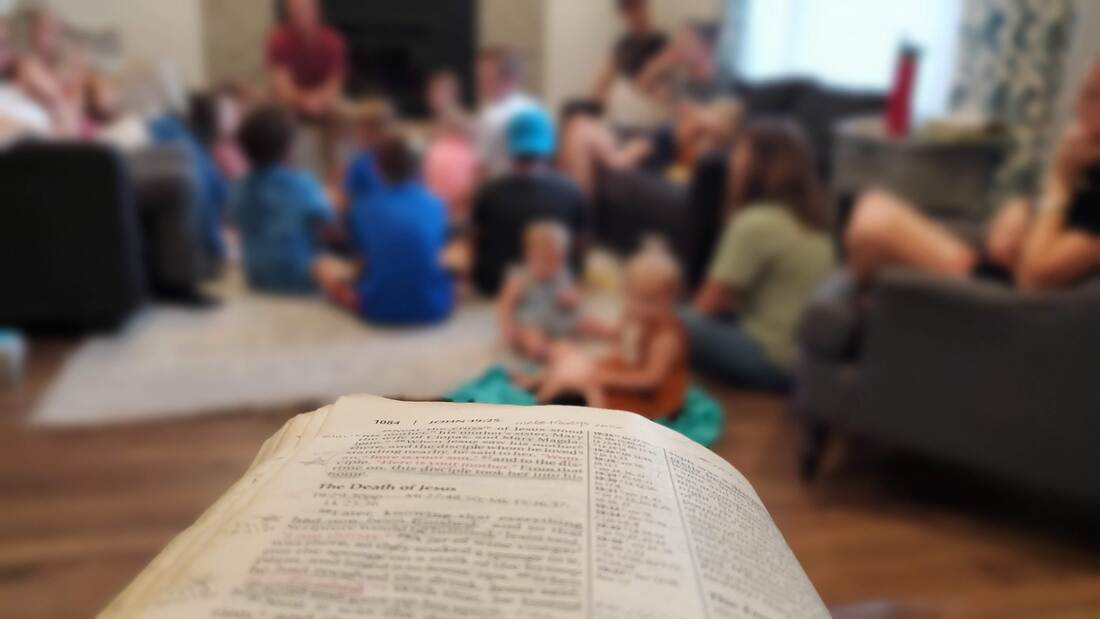







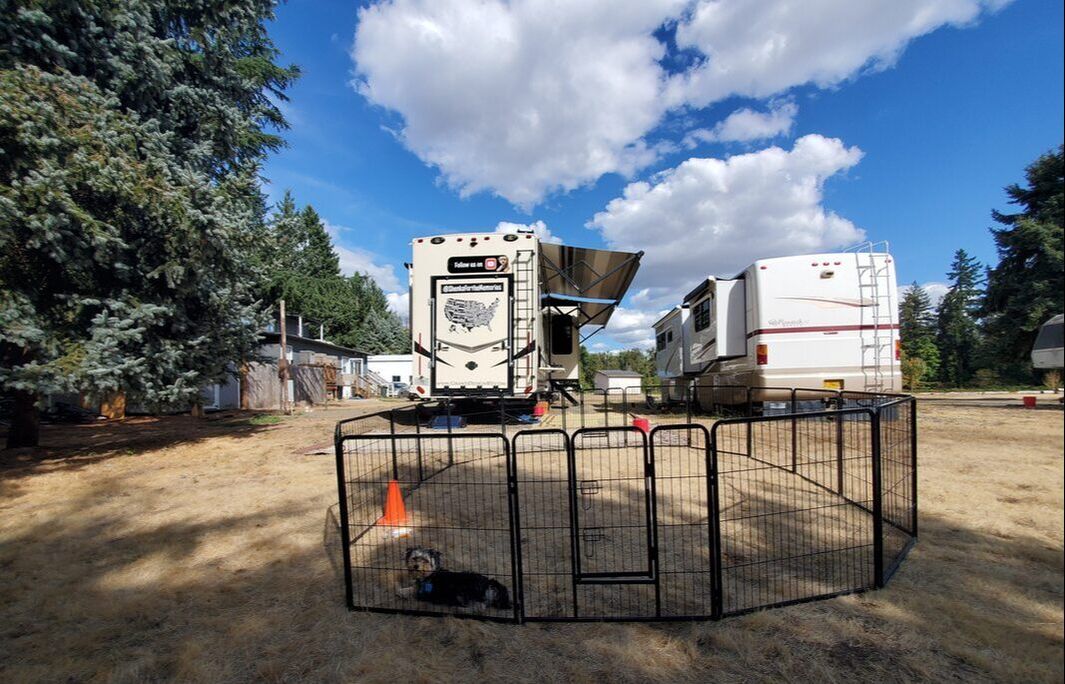






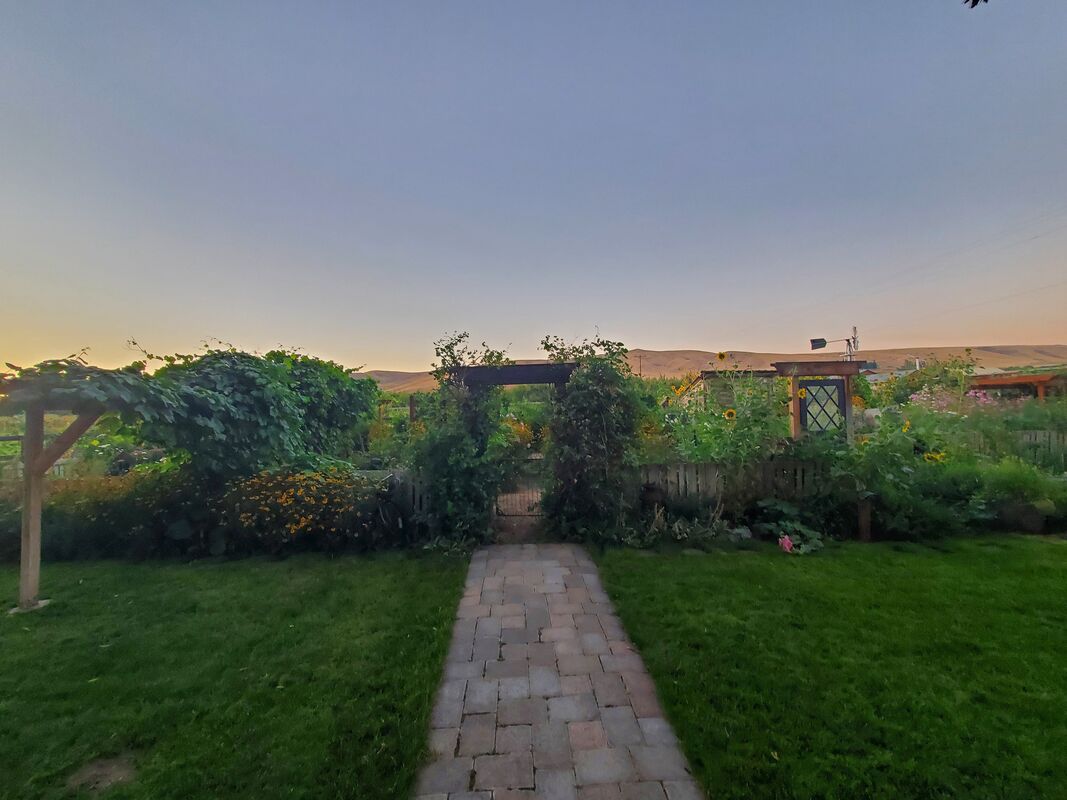





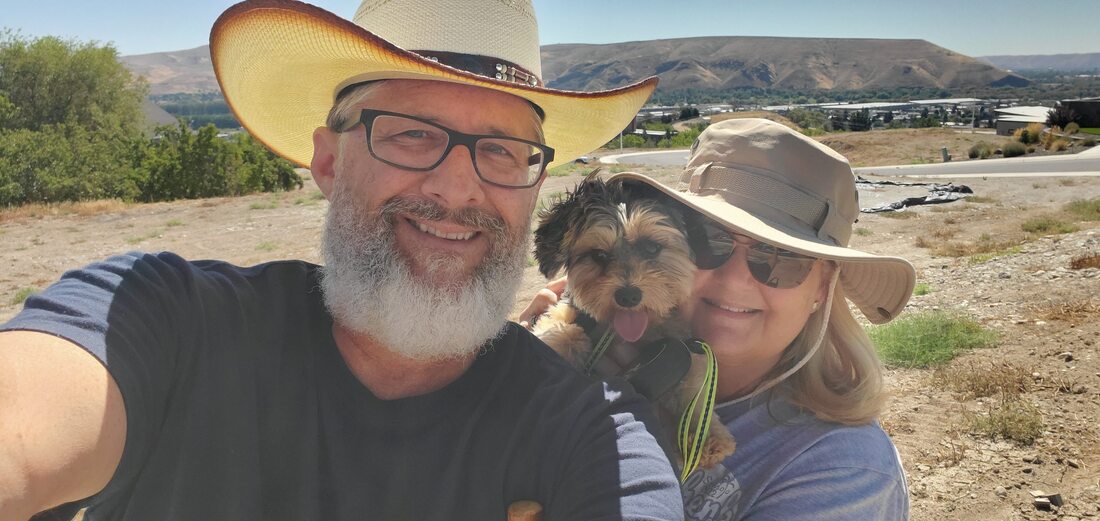





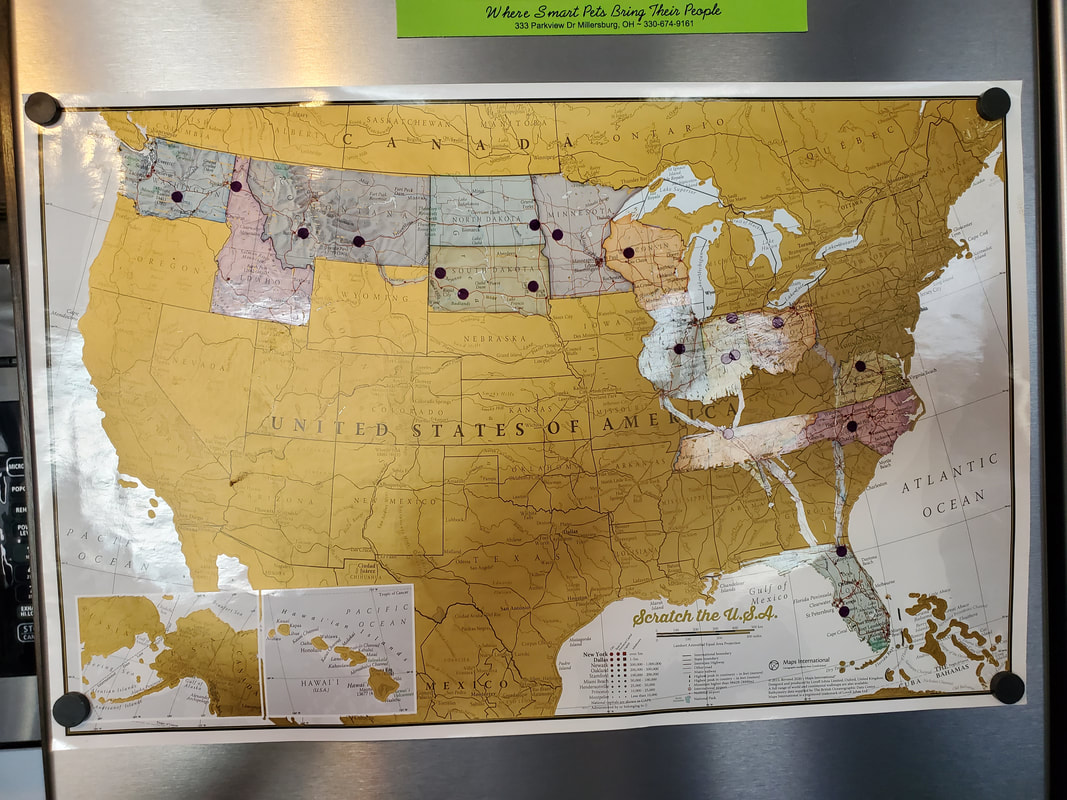



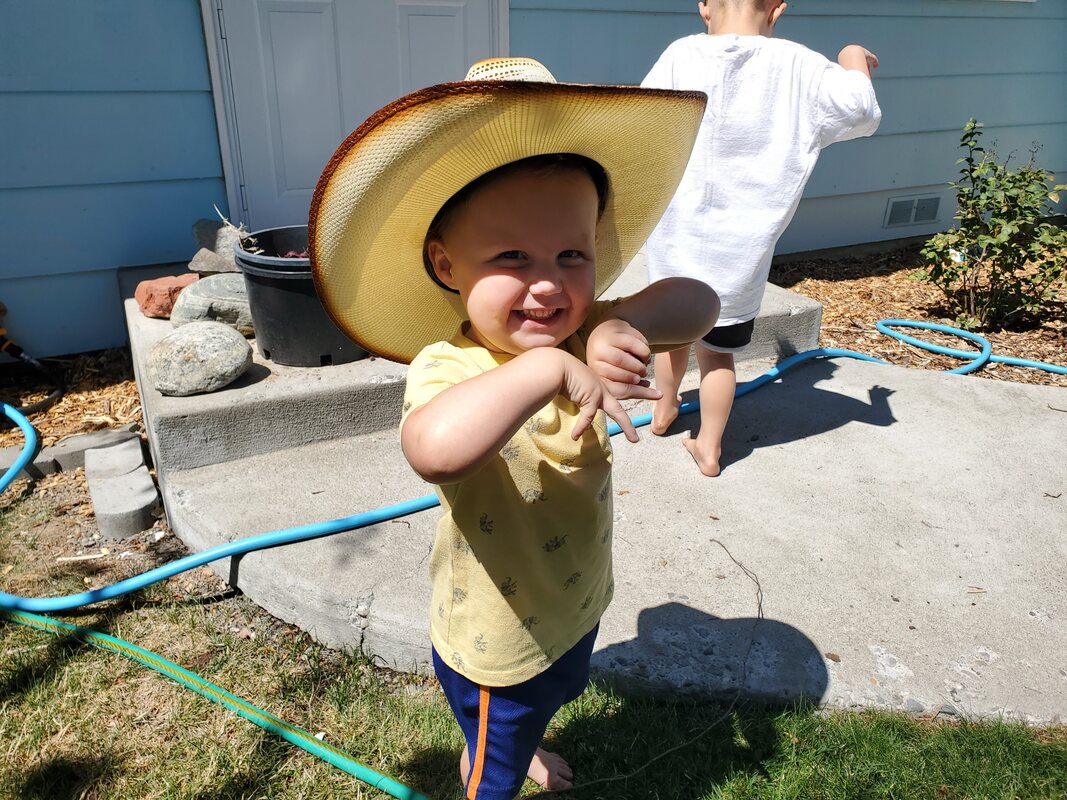











 RSS Feed
RSS Feed